Articles précédents

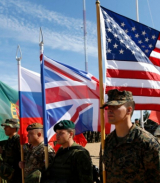 |
Les désaccords transatlantiques sous le second mandat de Donald Trump
FPRI Analysis
04 mars, 2025
Les tensions montent de part et d’autre de l’Atlantique, et la rhétorique s’intensifie. Depuis des mois, l’Europe se prépare au pire, c'est comme ça que la plupart des dirigeants et des observateurs européens voient un second mandat de Donald Trump. Cette fois, ils jurent être prêts à tenir tête au « bullying » du président américain. Plus encore, ils affirment qu’ils sauront en profiter pour faire avancer leur projet d’autonomie stratégique. Le feront-ils vraiment ? Et à quel degré ? Qu’y a-t-il de réellement nouveau dans la relation transatlantique, qu’est-ce qui est un simple prétexte, et quelles sont les motivations sous-jacentes ?
|
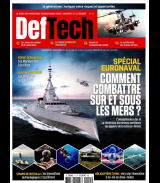 |
Pour le meilleur ou pour le pire : en matière d’armement l’UE s’active
DefTech N°11 octobre-décembre 2024
05 déc, 2024
Il y a dix ans, la Haute représentante pour les affaires étrangères et la politique de sécurité, la britannique Catherine Ashton interdisait encore les uniformes dans les couloirs du Conseil, enceinte pourtant censée mettre en œuvre la « politique de défense » de l’UE. Aujourd’hui l’expertise militaire est très demandée, jusque dans les bureaux de la Commission qui, auparavant, fut soigneusement tenue à l’écart de tout ce qui s’y rapportait. Le collège bruxellois s’engouffre dans la brèche ouverte par la guerre en Ukraine. Au motif de l’urgence et de l’efficacité, il part à l’assaut de l’article 346 du traité qui garantit la maîtrise des États dans ce secteur clé. Le but : devenir un « facilitateur » incontournable dans l’armement, au carrefour de la politique industrielle et de la politique étrangère et de défense.
|
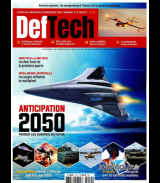 |
L’IA et la hache de pierre : les deux faces de la prochaine grande guerre
DefTech N°10 juillet-septembre 2024
20 juil, 2024
A l’ombre de la course technologique qui s’accélère à toute vitesse, principalement entre Chinois et Américains, les premières phrases d’une nouvelle de science-fiction d’Arthur C. Clarke, publiée en 1951 sous le titre de Supériorité, interpellent. Le narrateur, l’ancien commandant en chef d’une armée vaincue par un adversaire a priori plus faible, raconte : « La cause profonde de notre défaite est extrêmement simple. Un seul facteur a été déterminant : la science inférieure de nos ennemis. Je dis bien la science i n f é r i e u r e de nos ennemis. » Au fil de son récit, il s’avère que ce n’est pas la technologie supérieure en soi qui est à l’origine de leurs malheurs, mais l’hubris des humains qu’une telle supériorité suscite. Difficile, pour le lecteur d’aujourd’hui, de ne pas y déceler des analogies.
|
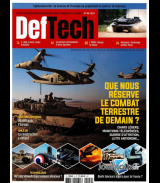 |
Le ciel va-t-il nous tomber sur la tête?L’Europe s’active en matière de défense aérienne/antimissile
DefTech N°9 avril-juin 2024
20 mai, 2024
Extrait: «En matière de défense aérienne et antimissile Berlin apparaît comme une araignée qui tisse sa toile… et Paris comme le dindon de la farce. (...) Berlin s’est donc ouvertement lancé à l’assaut des atouts français, y compris la BITD, que ce soit par le truchement de l’OTAN ou de l’UE. Paradoxalement la première est moins grave : certes l’ESSI capte le marché de l’écrasante majorité des alliés européens et les verrouille dans une coopération fondée en grande partie sur des solutions extérieures, mais au moins elle laisse la France intacte. L’alternative est plus pernicieuse. (…)»
|
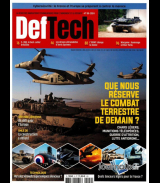 |
Les semi-conducteurs, terrain d’entraînement pour l’ambition « géopolitique » de l’UE
DefTech N°9 avril-juin 2024
05 mai, 2024
La loi européenne sur les semi-conducteurs a pour but de « rétablir un rapport de force dans la géostratégie de la chaîne de valeur », selon le Commissaire européen Thierry Breton. Venant des institutions bruxelloises, l’intention est un fait d’arme en soi. Ce « EU Chips Act », entré en vigueur sous forme de règlement en septembre 2023, vise à doubler la part européenne dans la production mondiale de semi-conducteurs pour atteindre 20% d’ici à 2030. L’UE entend mobiliser 43 milliards d’euros d’investissements à cette fin et esquisse un plan d’action en trois piliers : l’innovation, la fabrication, et un mécanisme de gestion des crises. Avec cette initiative, l’Union opère un virage à 180°. Les termes tabous il y a quelques années deviennent des mots d’ordre : intervention étatique, autonomie, réindustrialisation. Dans un contexte où la « sécurité économique » est propulsée au centre des préoccupations européennes, la loi sur les semi-conducteurs est une sorte de précurseur, dont les résultats et les failles instruiront les futures mesures dans d’autres domaines.
|
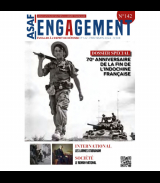 |
L’Alliance atlantique fête ses 75 ans : un anniversaire sous hypothèque
Engagement n°142 printemps 2024
17 mars, 2024
Force est de constater que l’OTAN est un exemple de longévité. S’approchant de son 75ème anniversaire, que ses pays membres s’apprêtent à célébrer au sommet de Washington en juillet, l’Alliance semble même reprendre du poil de la bête, sous l’effet unificateur de la guerre en Ukraine. Toutefois, la pluie d’auto-félicitations ne saurait faire oublier les lourdes incertitudes qui pèsent sur son avenir. Pour les surmonter, cette fois-ci un simple adjuvant ne suffira plus, c’est tout son ADN qu’elle devra repenser. En a-t-elle encore la force, en a-t-elle réellement l’envie ?
|
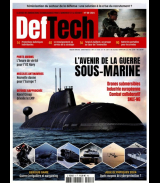 |
Le porte-avions John F. Kennedy, symptôme des dilemmes de la U.S. Navy
DefTech N°8 janvier-mars 2024
19 janv, 2024
(...) La fonction symbolique du porte-avions, étayée par des capacités opérationnelles indéniables, a été soulignée par le président Trump en 2017, à l’occasion de l’inauguration du Ford : « Quels que soient les horizons où se rendra ce navire, nos alliés dormiront tranquilles, et nos ennemis trembleront de peur ». Livrée à la Navy la même année, cette première unité de la nouvelle génération des porte-avions américains ne sera déployée que 5 ans plus tard, du fait de ses multiples déboires techniques. Un cadeau pour ceux qui, à l’intérieur de la bureaucratie du Pentagone, militent pour en finir avec le rôle central des porte-avions dans les planifications stratégiques pour des raisons d’efficacité relative et de vulnérabilité aux nouvelles technologies offensives, et n’hésitent pas à les comparer au feu le cuirassé. Des questionnements aggravés par les surcoûts et retards chroniques. Beaucoup espèrent que le deuxième de la série, le porte-avions John F. Kennedy (CVN-79), prévu pour livraison à la Navy en juillet 2025, fera taire les critiques. A moins qu’il ne les confirme.
|
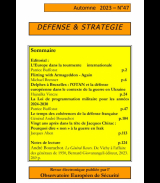 |
Delphes à Bruxelles : l’OTAN et la défense européenne dans le contexte de la guerre en Ukraine
Défense & Stratégie n°47 automne 2023
01 déc, 2023
Une semaine après le déclenchement de la guerre ukrainienne, la présidente de la Commission de Bruxelles déclarait « c’est un moment de vérité » pour l’Union européenne. Des propos dont l’ambiguïté n’est pas sans rappeler le flou délibéré des fameux oracles grecs, Dodone et Delphes. Avec le recul, seront-ils interprétés comme l’annonce d’une détermination et d’un élan européen sans précédent ou, au contraire, comme de mauvais augure anticipant une énième démonstration d’impuissance ? Est-ce le début d’une nouvelle ère pour la sécurité du vieux continent, et si oui, dans quel sens penchera la balance? Assiste-t-on à « la naissance de l’Europe géopolitique » comme le prétend le Haut représentant Josep Borrell, ou à « l’otanisation de l’Europe », pour citer le président Joe Biden ?
|
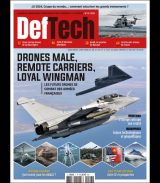 |
Initiatives en matière de munitions : l’Europe se tirera-t-elle une balle dans le pied ?
DefTech N°7 octobre-décembre 2023
20 oct, 2023
La triple décision de l’UE pour stimuler la livraison à l’Ukraine, l’achat en commun et la production de munitions participe de la nouvelle dynamique européenne pour renforcer la base industrielle et technologique, un domaine susceptible de devenir le moteur des ambitions d’autonomie stratégique. Ou, au contraire, leur frein le plus significatif. Tout dépendra des modalités des décisions prises. L’élan politico-rhétorique peut facilement se briser sur l’un, ou plusieurs, des trois écueils : pacifiste, atlantiste et fédéraliste. L’initiative sur les munitions est un cas d’école. Non seulement elle recouvre de nombreux aspects clés de la revigoration en cours et mobilise chacun des trois courants idéologiques, mais elle devra aussi, en toute logique, servir de matrice à d’autres initiatives à l’avenir.
|
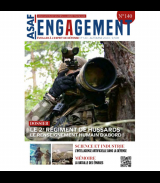 |
La montée du « Sud global »: sortir de nos ornières occidentales
Engagement n°140 Automne 2023
27 sept, 2023
Au sommet de Vilnius de l’OTAN, le président américain Joe Biden se félicite de l’effet unificateur de la guerre en Ukraine, et pas seulement entre alliés : « Cela unifie le monde. C’est un sacré prix à payer, mais c’est en train d’unifier le monde ». On se demande dans quel monde il vit. S’il y a un domaine où les évolutions depuis le déclenchement de la guerre en Ukraine confortent Moscou, c’est justement le découplage croissant entre l’Occident et « le reste », en phase avec les discours russes, et pas que, sur le sujet d’un monde multipolaire.
|
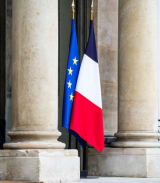 |
Autonomie stratégique: défaire la France sans faire l’Europe
Esprit Surcouf
23 sept, 2023
A en croire les déclarations du président Macron en matière de « souveraineté » (européenne, cela s’entend), le concept d’autonomie stratégique, prôné par Paris depuis des décennies, serait en train de conquérir les cœurs et les esprits. Mieux : « la bataille idéologique est gagnée », se félicite-t-il. Mais qu’en est-il vraiment ?
|
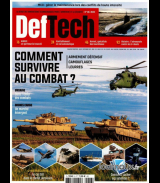 |
AUKUS, un nouveau modèle de partenariat sous stéroïdes
DefTech N°6 juillet-septembre 2023
19 juil, 2023
"A mesure que les plans se précisent, ce n’est pas le volet capacitaire qui se trouve au centre de toutes les attentions, ni même la portée stratégique du pacte tripartite dans la région indopacifique, mais son approche inédite de la coopération industrielle et technologique. A en croire les protagonistes, il s’agirait d’un véritable changement de paradigme. Sous réserve de la réforme de l’un des éléments les plus sclérosés du système américain, le nouveau modèle de quasi-fusion serait appelé à faire tache d’huile. Avis transmis aux autres alliés."
|
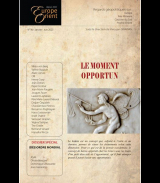 |
La Suède et la Finlande à la porte de l’OTAN (l'effet sur la politique de défense de l'UE)
Europe & Orient n°36
13 juin, 2023
"Parmi les atouts que les responsables otaniens énumèrent pour souligner que les deux pays nordiques seront des « contributeurs nets » à la sécurité des alliés on trouve, mine de rien, le grand nombre de chars, l’expérience dans la défense du territoire et… la conscription qui n’a jamais été suspendue en Finlande et fut rétablie en Suède en 2017. Bref, ce que l’on nous a présenté, depuis les années 1990, comme démodé, appartenant à « la guerre d’hier » serait un atout aujourd’hui. Un bon rappel, s’il en fallait un, pour ne pas prendre toutes les déclarations du moment au pied de la lettre. A commencer par le discours convenu autour de l’adhésion de la Finlande et de la Suède." (Extrait)
|
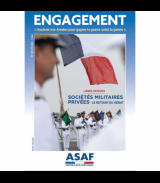 |
Autonomie stratégique : défaire la France sans faire l’Europe
Engagement n°139 Eté 2023
12 juin, 2023
A en croire les récentes déclarations du président Macron en matière de « souveraineté » (européenne, cela s’entend), le concept d’autonomie stratégique, prôné par Paris depuis des décennies, serait en train de conquérir les cœurs et les esprits. Mieux : « la bataille idéologique est gagnée », se félicite-t-il. Mais qu’en est-il vraiment ?
|
 |
PowerPoint transforme-t-il l’armée qui l’utilise ?
DefTech N°5 avril-juin 2023
09 mai, 2023
"Les objections soulevées sont de deux ordres. D’une part, le recours excessif à PowerPoint risque d’empêcher toute réflexion critique et dénature la prise de décision, de l’autre il condamne les officiers subalternes à préparer des diaporamas à longueur de journée : d’où l’expression PowerPoint Rangers, leur surnom. Toujours est-il que la méthode fait tache d’huile. Les partenaires de l’Amérique l’adoptent eux aussi, soit pour pouvoir continuer à communiquer avec l’armée américaine, soit parce qu’ils espèrent ainsi imiter sa « modernité » à peu de frais." (Extrait)
|
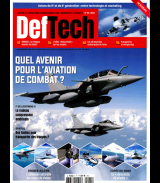 |
Le F-35 : une formidable opportunité… en creux
DefTech N°5 avril-juin 2023
01 mai, 2023
"Ce chasseur-bombardier furtif dit de 5e génération dont la seule description possible s’exprime en superlatifs, est censé « transformer » non seulement le combat aérien mais également la manière de construire des avions, voire la nature même des relations entre alliés. S’il peut finir par les transformer tous, c’est de façon indirecte : en posant les jalons de ce qu’il ne faudrait surtout pas faire." (Extrait)
|
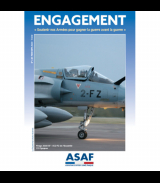 |
La Suède et la Finlande à la porte de l’OTAN : leçons, pièges et faux-semblants
Engagement n°138 Printemps 2023
15 mars, 2023
L’effet boomerang que constitue, pour le président Poutine, l’adhésion prévue d’Helsinki et de Stockholm à l’Alliance atlantique est souvent décrit en ces termes : « Moscou a voulu la finlandisation de l’Ukraine, il aura l’otanisation de la Finlande et de la Suède ». Plutôt que de ressasser une énième fois les éléments déjà bien connus de l’équation – soit des évidences, soit d’importance secondaire – il est temps de se concentrer sur l’essentiel c’est-à-dire sur ce qui se trouve, pour rester dans l’univers nordique, au-dessous de la pointe de l’iceberg. Que nous révèle, nous enseigne et nous cache le processus d’adhésion des deux nouveaux candidats à l’Alliance ? Aucun suspense : sur chacun de ces points, le principal perdant est l’Europe de la défense.
|
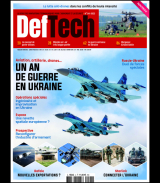 |
Le secteur de l’armement au prisme de la guerre en Ukraine : reconfiguration réelle ou virtuelle?
DefTech N°4
25 janv, 2023
"Ce n’est pas que la guerre russo-ukrainienne soit sans impact, loin de là. Elle accélère les tendances déjà à l’œuvre qui consistent à prendre acte – à l’instar de la Stratégie de défense nationale américaine de 2018 – du durcissement de la conflictualité et de l’exacerbation de la compétition stratégique entre l’Occident et les puissances dites « révisionnistes ». Les livraisons d’armes à l’Ukraine, et plus généralement le passage à « l’économie de guerre », mettent en lumière les tensions au sein du bloc transatlantique sur le plan commercial et industriel. Les décisions prises dans ce contexte, a fortiori dans le secteur de la défense, éclairent les intentions et la détermination des uns et des autres – elles en exposent aussi les limites." (Extrait)
|
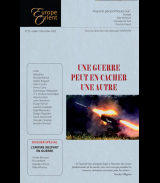 |
Retombées de la guerre en Ukraine – l’Amérique première puissance européenne?
Europe & Orient n°35
20 déc, 2022
L’otanisation de l’Europe », l’expression vient du président Biden lui-même pour décrire le processus qui s’est déclenché dès le moment où l’armée russe a franchi la frontière ukrainienne. Cela aurait pu se passer autrement. D’aucuns pensaient que les Européens, confrontés à la réalité de la chose militaire qu’ils avaient délaissée depuis des décennies, allaient réagir par un sursaut d’autonomie. Il n’en fut rien. L’expérience a été vécue d’emblée sous le double sentiment de l’impuissance diplomatico-militaire européenne et du parapluie américain véhiculé par l’OTAN et son article 5. La position des Etats-Unis en tant que « puissance européenne » s’en trouve singulièrement renforcée. Durera, ne durera pas ? Des incertitudes existent.
|
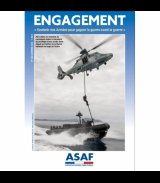 |
Retombées de la guerre en Ukraine – l’Amérique première puissance européenne?
Engagement n°136 Automne 2022
16 sept, 2022
L’otanisation de l’Europe », l’expression vient du président Biden lui-même pour décrire le processus qui s’est déclenché dès le moment où l’armée russe a franchi la frontière ukrainienne. Cela aurait pu se passer autrement. D’aucuns pensaient que les Européens, confrontés à la réalité de la chose militaire qu’ils avaient délaissée depuis des décennies, allaient réagir par un sursaut d’autonomie. Il n’en fut rien. L’expérience a été vécue d’emblée sous le double sentiment de l’impuissance diplomatico-militaire européenne et du parapluie américain véhiculé par l’OTAN et son article 5. La position des Etats-Unis en tant que « puissance européenne » s’en trouve singulièrement renforcée. Durera, ne durera pas ? Des incertitudes existent.
|
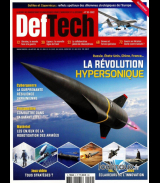 |
Copernicus et Galileo, reflets spatiaux des dilemmes stratégiques de l’Europe
DefTech N°2, juin-août 2022
25 juil, 2022
Mi-février 2022, une semaine à peine avant le déclenchement de la guerre en Ukraine, l’Europe spatiale se réunit à Toulouse au grand complet, dans des formations diverses, pour parler de... l’intensification des rivalités géopolitiques et du rôle crucial qu’y joue désormais l’Espace. Le président Macron commence son discours en évoquant « deux succès majeurs », à savoir « Copernicus qui assure la collecte et l’analyse des données d’observation de la Terre, et Galileo qui permet gratuitement un accès à son positionnement de manière plus précise que le GPS ». A la conférence dédiée à Copernicus, le commissaire européen au marché intérieur, Thierry Breton, parle de « l’évolution des besoins dans un nouveau contexte géostratégique ». Il en profite pour mettre en avant deux priorités toujours prônées par la France : la non-dépendance et la défense. D’un côté, il souligne l’importance de cette « infrastructure souveraine ». De l’autre, au motif de la « résilience », il plaide pour la nécessaire prise en compte de la dimension militaire.
|
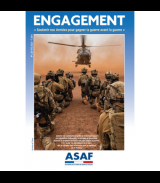 |
L’OTAN l’emporte par KO sur l’autonomie européenne – du moins à court terme
Engagement n°135 Eté 2022
10 juin, 2022
Hier encore « en état de mort cérébrale », la guerre en Ukraine aurait donné à l’OTAN un véritable « électrochoc » selon le président Macron. Dans les cénacles de l’Alliance, il se murmure que c’est l’occasion ou jamais pour venir à bout des dossiers les plus conflictuels. Le mot d’ordre est tout trouvé : l’unité politique est cruciale pour préserver la crédibilité, dans un contexte où même la confrontation nucléaire ne peut pas être complètement écartée. Ce n’est vraiment pas le moment pour s’attarder sur des divergences « idéologiques » en matière de financement en commun, d’achats d’armement, de transferts d’autorité militaire, ou de compétences politiques. L’ambiance est, certes, quelque peu biaisée, mais, comme disait Churchill : « il ne faut jamais gaspiller une bonne crise ».
|
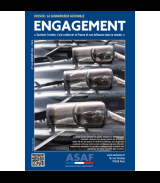 |
Des biscuits et des missiles: en Ukraine, le triangle Washington-Europe-Russie
Engagement n°134 Printemps 2022
08 mars, 2022
À la fin de l’affrontement bipolaire, l’excellent diplomate américain alors ambassadeur à Moscou, Robert S. Strauss, signale à Washington : « L’événement le plus révolutionnaire de l’année 1991 pour la Russie n’est pas l’effondrement du communisme, mais la perte de l’Ukraine ». Trente ans plus tard, le sort de ce pays frère-ennemi reste, pour Moscou, un des points les plus sensibles. Par le truchement de l’OTAN/l’Amérique, c’est à Kiev que se jouent donc, en grande partie, les relations entre l’Europe et la Russie. Washington sait parfaitement bien qu’en maintenant la pression sur ce point névralgique, il garde sa place de maître du jeu dans la sécurité européenne.
|
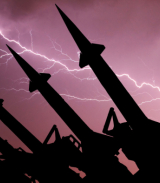 |
Les tambours de guerre russo-ukrainiens font ressortir un tabou de trente ans de l'OTAN
Portfolio
11 janv, 2022
Après la mobilisation spectaculaire des troupes russes à la frontière ukrainienne et les admonestations occidentales en réponse, Moscou a décidé de passer la balle à l’OTAN et à Washington. Fait inhabituel en diplomatie, il a décidé de publier au grand jour, à l'adresse de l'un et de l’autre, un projet d'accord. Ce que certains considèrent comme une base de négociation, d'autres comme un ultimatum, d'autres encore comme de la pure provocation. Le point focal des deux textes est l'expansion vers l’Est de l'organisation militaire dirigée par les États-Unis, y compris l'éventuelle adhésion de l'Ukraine à l’Alliance atlantique. Plus précisément le rejet catégorique de celle-ci. Le président Poutine pourrait ainsi frapper plusieurs oiseaux d’un coup : souder sa propre opinion publique derrière lui, tout en attisant les contradictions entre les alliés de l'OTAN, et qui plus est sur une question où, objectivement parlant, les arguments de la Russie ne peuvent être balayés d'un revers de la main.
|
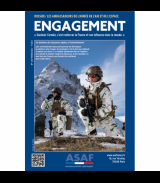 |
Les Etats-Unis retentent leur « pivot » vers l’Asie, cette fois-ci sous le nom d’Indopacifique
Engagement n°133 Hiver 2021
06 déc, 2021
L’expression Indopacifique est apparue sur les radars du grand public avec l’affaire des sous-marins australiens. Concomitamment avec la rupture d’un contrat de 56 milliards d’euros avec la France a été annoncée une alliance stratégique entre l’Australie, le Royaume-Uni et les Etats-Unis (dénommée AUKUS). A quelque chose malheur est bon, le scandale diplomatique qui s’en est suivi a braqué tous les projecteurs sur cette partie du monde. Dans cette zone immense qui est devenue, en ce début du XXIème siècle, le centre de gravité de la croissance et des échanges internationaux, les Etats-Unis entendent peser de tout leur poids, afin d’endiguer l’expansion chinoise. Sur ce point, l’administration Biden s’inscrit dans les pas de Trump, et va même encore plus loin. Paralysés par leurs multiples dépendances – militaire vis-à-vis de l’Amérique, économique par rapport à la Chine – les Européens ont quelques difficultés à ne serait-ce que saisir les enjeux.
|
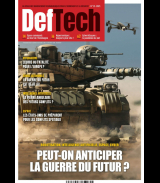 |
Hyperguerre: leurre ou fatalité pour l'Europe?
Revue DefTech N°12, 3e trimestre 2021
25 oct, 2021
« Dans dix ans, une nouvelle guerre majeure en Europe serait une hyperguerre » - c’est en ces termes sans appel que deux anciens commandants de l’OTAN et un éminent spécialiste britannique de l’Alliance introduisent, pour le grand public, la notion d’hyperguerre dans leur récent livre.[1] Ils mettent donc un mot évocateur et facile à retenir sur un phénomène annoncé par beaucoup, à savoir un imminent changement de paradigme de la chose militaire, du fait de l’arrivée sur les champs de bataille de technologies de rupture, au premier rang desquelles l’intelligence artificielle. Le lecteur avisé éprouvera sans doute un vague sentiment de déjà-vu. Les formules et l’ambiance ressemblent à s’y méprendre à la RAM (Révolution dans les affaires militaires) des années 1990. Seules les technologies varient. Il n’en reste pas moins que les Européens se retrouvent, à nouveau, face à un dilemme. Tireront-ils les bonnes leçons de leurs expériences récentes ou se condamneront-ils plutôt à un suivisme pur et simple par rapport à leur allié américain ? Pour une fois, la réponse est peut-être moins évidente qu’il n’y paraît.
|
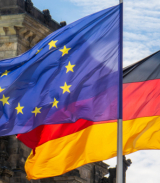 |
Les Allemands sont-ils de « bons Européens »? Ou...
Portfolio
25 sept, 2021
...ne font-ils qu'utiliser l’UE pour renforcer encore davantage leur propre puissance nationale ?
Au sujet des élections allemandes, les spéculations vont bon train quant à savoir ce que signifierait un tel ou tel nouveau gouvernement allemand pour la construction européenne. Il serait sans doute utile de revenir d’abord sur ce que l’Europe signifie, en général, pour l’Allemagne et vice versa. Car il y a peu de chance que les grandes lignes, les mêmes depuis de longues décennies, changent. En 1963, le président français Charles de Gaulle trancha de façon sommaire : « Les Allemands se conduisent comme des cochons. Ils trahissent l'Europe ». Cette vision, certes soigneusement voilée derrière des formules diplomatiques, n’en est pas moins largement partagée outre-Rhin, y compris aujourd’hui. Parallèlement, en d’autres endroits, il est commun de considérer Berlin comme le bon élève de l'UE : l’Allemagne paierait comme une véritable vache à lait ; elle donnerait de plus en plus de pouvoir aux institutions communautaires ; il n’y aurait pas plus écolo qu’elle ; et sur les questions de défense, elle se fait modeste (tout au plus lâche-t-elle quelques mots ici et là sur le désarmement global et la paix universelle). Serait-il possible que tout ceci ne soit qu’une savante tactique ?
|
 |
L'Europe veut devenir une superpuissance numérique – du moins c’est ce qu’elle dit
Portfolio
22 aout, 2021
Dans le secteur numérique, les Américains font du business, les Chinois copient et les Européens régulent, selon la formule consacrée, devenue largement obsolète. Car à mesure que la Chine se positionne de plus en plus en concurrent des États-Unis, la rivalité technologique est désormais une priorité stratégique pour les deux. La nouvelle donne siffle « la fin de la récrée » : même ce rôle de régulateurs, les Européens pourraient bientôt le perdre. Alors que Washington et Pékin mobilisent des centaines de milliards de dollars et tout leur arsenal politico-diplomatique en soutien du secteur technologique, la plupart des États membres de l’UE ne voit pas plus loin que le bout de son nez : ils tiennent au dogme du « marché ouvert » pour saborder toute initiative autonome, européenne. Ceci alors même que, pour reprendre la comparaison faite par le directeur d’Ericsson, quelqu’un qui n’a aucun constructeur automobile, pas beaucoup de routes, ne peut pas imposer des règles du code de la route. Sans la maîtrise intégrale des technologies et des infrastructures numériques de rupture, l’Europe sera tôt ou tard obligée d’importer les éléments clés, règles comprises, des autres.
|
 |
Un rideau de fer numérique risque de s'ériger dans la nouvelle guerre froide
Portfolio
24 juil, 2021
L’ennemi prend le contrôle à distance d’un F-35 américain hypersophistiqué survolant le détroit d’Ormuz, et force l’avion à atterrir ; à Washington, le conseiller du président est alerté par son interlocuteur chinois d’un texto venant de sa mère – y compris le contenu du message ; le système de communication de l’administration toute entière tombe en panne, des téléphones de bureau jusqu’aux cartes bleues de fonction, en passant par les e-mails ; la flotte américaine évoluant dans la mer de Chine méridionale devient sourde, muette et aveugle d’un coup à la suite d’une cyberattaque – les bâtiments de guerre finissent par communiquer entre eux avec des signaux flottants. Ces scènes figurent dans un livre récent, « 2034 – La prochaine guerre mondiale », co-signé par l’amiral James Stavridis, ancien commandant suprême de l'OTAN. Le timing n’est pas le fruit du hasard. Ces jours-ci, lorsque des décisions de plus en plus tonitruantes sont prises à propos de Huawei, ZTE, Google, Facebook et compagnie, c’est ce genre de scénario catastrophe, voire pire, qui se trouve au bout du raisonnement des décideurs politiques.
|
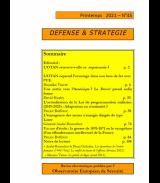 |
L’OTAN reprend l’avantage dans son bras de fer avec l’UE
Défense & Stratégie n°45 printemps 2021
16 juin, 2021
Jamais on n’a autant parlé et aussi publiquement de l’autonomie stratégique européenne que pendant l’année 2020, et rarement auparavant les limites politiques de ladite autonomie étaient apparues aussi crûment. Un paradoxe largement en phase avec l’oscillation de la posture américaine : tandis que sous l’administration Trump même les plus atlantistes des Européens ne pouvaient plus échapper à une certaine prise de conscience, après l’arrivée de l’administration Biden, en revanche, les efforts visent surtout à escamoter le fait que dans les relations transatlantiques seul le ton change.
|
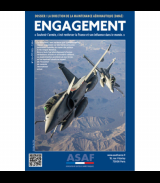 |
Les Européens face à l’ancienne-nouvelle politique étrangère américaine
Engagement n°131
15 juin, 2021
Dès son entrée en fonction, l’administration Biden entérine le changement de paradigme de la politique américaine. Après les détours, les tâtonnements et les approches mi-figue mi-raisin qui ont caractérisé les deux dernières décennies, la nouvelle équipe poursuit et consolide la transition entamée par son prédécesseur honni : le XXIème siècle sera dominé, sans ambiguïté aucune, par la confrontation avec la Chine. Le reste – y compris les autres adversaires, de même que les alliés européens – va être interprété, traité et, le cas échéant, instrumentalisé en fonction de ce duel.
|
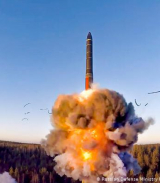 |
L’apocalypse nucléaire ajournée – au lieu du bunker antiatomique, un château de cartes
Portfolio
28 févr, 2021
L’extension de 5 ans de l’accord nucléaire russo-américain, le Nouveau Traité START eut l’effet d’une bombe, pour ainsi dire, dans les milieux de la maîtrise des armements, à peine deux semaines après l’entrée en fonction de l’administration Biden. Le spectre de l’apocalypse nucléaire s’est évaporé, ou du moins fut reporté sine die. Le monde entier peut pousser un soupir de soulagement. Ou peut-il vraiment ? Un tel accord vaut-il plus que le papier sur lequel il est écrit ? Et qu’en est-il des autres accords censés le compléter mais qui s’était vidés depuis ? Et pourquoi la Chine, l'ennemi n°1 des Etats-Unis, n’y figure pas ? Et en ce qui nous concerne au premier chef : comment se fait-il que l’Europe n’a toujours pas son mot à dire dans les négociations qui se poursuivent, au-dessus de sa tête, entre Russes et Américains ?
|
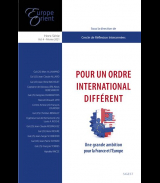 |
Qui a plus « besoin de l’OTAN » ? La France ou…les USA ?
Pour un ordre international différent. Une grande ambition pour la France et l'Europe (dir. Cercle de Réflexion Interarmées)
01 févr, 2021
Coutumier des déclarations fracassantes mais pas forcément étayées par les faits, le président Donald Trump en a placé deux d’un coup, au sommet de l’Alliance en décembre 2019, lors d’une conférence de presse : « Personne n’a besoin de l’OTAN plus que la France (…) Les Etats- Unis en tirent vraiment le moins de bénéfices ». Deux inepties qui méritent que l’on s’y arrête.
|
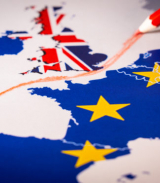 |
Le Brexit, camouflet ou cadeau pour l'Europe?
Portfolio
28 janv, 2021
Derrière les jérémiades sans fin sur la « perte » du Royaume-Uni, en réalité beaucoup s’en réjouissent, qui pour une raison, qui pour une autre. Les avocats de l’Europe fédérale pensent que la voie est dégagée, maintenant que l’ennemi juré de toute idée de mise en commun (approfondissement de l’intégration) se trouve écarté du jeu pour de bon. Les chantres d’une Europe indépendante – laquelle dépendrait moins de l’Amérique – observent d’un sourire narquois le départ du « cheval de Troie » des Etats-Unis, croyant que leur moment est enfin venu : sans Londres, l’éternel torpilleur de toute initiative politique ou militaire de l’Union, l’Europe pourrait devenir elle aussi un des pôles de puissance du monde. De tels raisonnements ne sont pas complètement sans fondement – mais c’est sans compter avec les déchirements internes des Vingt-Sept restants.
|
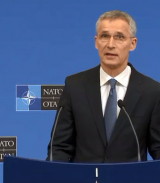 |
L'OTAN en langue de bois
Note IVERIS
10 déc, 2020
L’art de l’esquive, pratiqué à la perfection par Jens Stoltenberg, Secrétaire général de l’Alliance de l’Atlantique Nord, fut déployé dans toute sa splendeur lors d’un entretien accordé début décembre 2020 à Politico. Tous les sujets polémiques y furent passés en revue, sans même l’ombre d’une réponse ou d’une clarification pour aucun d’entre eux. En revanche, on a pu y admirer les principaux éléments de langage auxquels on aura droit dans les prochains mois. Petit dictionnaire du volapük otanien.
|
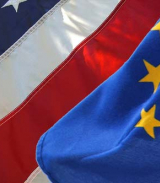 |
Débat sur les relations transatlantiques
Hungarian Europe Society
03 déc, 2020
Conversation, en anglais, sur les relations transatlantiques. Un débat modéré par Istvan Hegedus, avec Charles A. Kupchan, Thibault Muzergues et Veronica Anghel. La vidéo est disponible à ce lien.
|
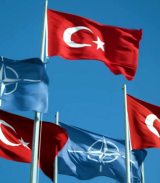 |
La Turquie dans l’OTAN, entre utilité et hostilités
Note IVERIS
26 nov, 2020
Qui peut oublier cette scène surréaliste d’une fin de dîner de l’OTAN en mai 2015 à Antaliya, où à l’invitation du ministre des Affaires étrangères turc, hôte de l’événement, des responsables de l’Alliance et de ses Etats membres entonnent tous ensemble, bras dessus bras dessous, le tube de Michael Jackson et de Lionel Richie : « We are the world » ? Deux ans plus tard, lors d’un exercice OTAN en Norvège, l’ambiance est beaucoup plus morose. Les quarante militaires turcs y participant viennent d’être retirés, à effet immédiat, par leur gouvernement. La cause ? Suite aux initiatives individuelles d’un technicien et d’un officier norvégien, l’image d’Atatürk (fondateur de la République de Turquie) fut projetée comme cible ennemi, et de faux messages au nom du président Erdogan ont été diffusés sur les réseaux sociaux internes de l’OTAN.
|
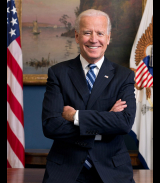 |
Joe Biden et l'Europe: les bénéfices et les inconvénients de l'enrobage en sucre
Portfolio
12 nov, 2020
En arrière-fond des festivités pan-occidentales célébrant la victoire de Joe Biden, on devine quelques notes de prudence, plus en tout cas que ce n’était le cas il y a douze ans, lorsque Barack Obama a succédé à George W. Bush à la présidence américaine. Bien entendu, les rengaines du type « la vraie Amérique est de retour » sont de nouveau entonnées à tue-tête – non complètement sans raison à certains endroits et sur certains sujets. En revanche, pour l’Europe la question se pose : est-ce qu’elle aura plus à gagner ou à perdre avec Biden et sa nouvelle administration.
|
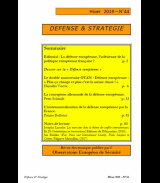 |
Double anniversaire OTAN - défense européenne: « Plus ça change et plus c’est la même chose ! »
Défense & Stratégie n°44, hiver 2019, pp.6-32
30 mars, 2020
Extrait: "Derrière les beaux discours sur « l’autonomie stratégique », la mise en œuvre oppose, comme toujours, le gaullisme résiduel de Paris à l’opinion majoritaire des partenaires qui tiennent à préserver, littéralement à tout prix, la primauté de l’Alliance atlantique. Jusqu’ici rien de nouveau. Sauf que la position française oscille – au pire moment, lorsque tous les événements la confortent pourtant – entre deux approches. Entre « intransigeance sur les principes » et « composer avec le réel », elle espère pouvoir ménager la chèvre et le chou. Autrement dit : avancer vers l’objectif d’émancipation européenne sans trop heurter le tropisme atlantiste-otanien de ses partenaires de l’UE – ce qui équivaut à la quadrature du cercle. Cette démarche a conduit à une extraordinaire confusion dans le discours du président Macron à l’Ecole de Guerre en février 2020, où il a réussi à placer dans un même paragraphe les deux visions antinomiques. D’un côté, il parle de « cette Europe de la défense, ce pilier européen au sein de l’OTAN », de l’autre il met les deux sur un pied d’égalité :« l’OTAN et l’Europe de la défense sont les deux piliers de la sécurité collective européenne » Tôt ou tard, il faudra choisir..."
|
 |
Aux racines de notre absence d'Occident
Népszava
15 mars, 2020
La Conférence de sécurité de Munich, organisée chaque année, est une grand-messe transatlantique aux rituels bien rodés. C’est la crème de la crème de part et d’autre de l’Atlantique qui se retrouve ici (présidents, premiers ministres, commissaires européens, parlementaires de premier plan, dignitaires OTAN, ministres des Affaires étrangères et ceux de la Défense) pour affirmer, en se rassurant, qu’en dépit de tels ou tels désagréments du moment, les intérêts restent « communs », les valeurs « partagées », et la sécurité « indivisible ». Sauf que cette année, aucun des trois ne fut crédible. Et ce, de manière hautement visible. Au point que les organisateurs ne s’efforçaient même plus à s’en cacher. L’édition 2020, la cinquante-sixième de la série, eut lieu sous le titre de « Westlessness », ce qui associe, en bon anglais, la notion de l’absence d’Occident à l’idée de « tourments »
|
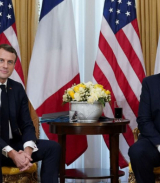 |
Qui a plus « besoin de l’OTAN » ? La France ou… les USA?
IVERIS
12 déc, 2019
Coutumier des déclarations fracassantes mais pas forcément étayées par les faits, le président Trump en a placé deux d’un coup, au dernier sommet de l’Alliance, lors d’une conférence de presse : « Personne n’a besoin de l’OTAN plus que la France (…) Les Etats-Unis en tirent vraiment le moins de bénéfices ». Deux inepties qui méritent que l’on s’y arrête.
|
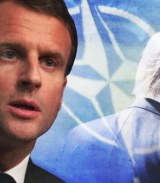 |
Au-delà des critiques de Macron sur l'OTAN: un malaise français croissant vis-à-vis de l'Alliance
Foreign Policy Research Institute
26 nov, 2019
En parlant, dans un entretien accordé à The Economist, de la « mort cérébrale » de l’Alliance atlantique, le président Macron pouvait être certain de provoquer le courroux de ses homologues européens. S’il a choisi de s’y lancer, c’est parce qu’il y voit une urgente nécessité. A un an des prochaines élections US et avec l’enlisement du Brexit, une fenêtre d’opportunité sans précédent est en train de se fermer. Cet alignement des planètes unique, qui dans la vision française aurait dû permettre d’entraîner enfin les partenaires de l’UE sur le chemin de l’autonomie stratégique, n’a pas vraiment porté ses fruits.
|
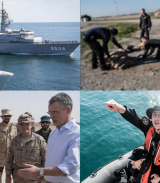 |
Une OTAN de plus en plus englobante
IVERIS
18 oct, 2019
Depuis plus de vingt ans, les Etats-Unis poussent à « globaliser » l’Alliance, au motif qu’elle doit s’adapter aux nouveaux risques et menaces si elle veut, soi-disant, « rester pertinente » (en d’autres termes : prouver son utilité pour les intérêts américains et s’assurer, en échange, le maintien de l’engagement US sur le vieux continent). Le raisonnement est, somme toute, logique. Sauf que pour les Européens il aboutirait mécaniquement à abandonner toutes leurs politiques. Le défi consiste à empêcher, autant que faire se peut, que le champ de compétences de l’organisation s’étende à d’autres domaines (non-militaires) et à d’autres zones géographiques (au-delà de l’espace euro-atlantique). Car l’objectif des efforts de « globalisation » est de faire en sorte que les Européens – qui dans l’OTAN se trouvent dans une position de subordination par rapport à l’Amérique – formulent leurs politiques diverses et variées non plus en dehors, mais au sein de l’Alliance atlantique.
|
 |
Proposition indécente ? Ce que l’idée de Trump d’acheter le Groenland nous dit sur l’OTAN
IVERIS
22 sept, 2019
En jetant son dévolu sur l’île de Groenland, le président Trump a provoqué, comme à l’accoutumée, un mélange de consternation, d’opprobre et de franche rigolade sur la scène internationale. La plupart des commentaires se contentaient de critiquer son style et sa bouderie : il a parlé d’une « grosse transaction immobilière » et, face au refus de vente, il a annulé sa visite prévue et traité les propos du Premier ministre danois de « méchants ». Des observateurs plus avisés ont fait remarquer que l’initiative de Trump est moins fantasque qu’elle n’y paraît au prime abord – elle s’inscrit dans une politique américaine poursuivie de longue date dans la région. Quoi qu’il en soit, pour l’Europe l’essentiel n’est pas là. Il est plutôt dans la mise à nu, pour la énième fois depuis l’arrivée de Trump au pouvoir, d’un raisonnement américain aussi implacable qu’inconfortable.
|
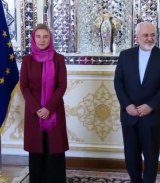 |
L'Iran, l'UE et les Etats-Unis: les Européens à la recherche d'une (relative) autonomie
Foreign Policy Research Institute
28 mars, 2019
Les récents efforts par la France, le Royaume-Uni et l’Allemagne pour mettre en place un mécanisme financier en vue de contourner les sanctions extraterritoriales américaines contre l’Iran sont révélateurs d’un besoin croissant de s’affirmer par rapport aux USA. Depuis de longs mois, les Européens essaient de trouver un moyen pour préserver l’accord nucléaire, en dépit du retrait décidé par le président américain. Leurs manœuvres ont moins à voir avec la politique envers Téhéran, qu’avec le positionnement vis-à-vis des USA, et plus encore avec l’idée que l’Europe se fait d’elle-même en tant qu’acteur international.
|
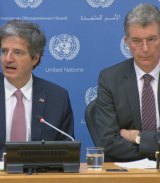 |
Une seule voix, mais laquelle? La France devrait-elle céder à l'UE son siège au Conseil de sécurité?
Foreign Policy Research Institute
20 mars, 2019
La présidence « partagée » du Conseil de sécurité des Nations Unies entre la France (membre permanent) et l’Allemagne (membre non permanent, élu pour deux ans) en mars-avril ne saurait occulter les récentes échauffourées des deux partenaires au sujet, justement, de leurs places respectives aux Nations Unies. L’Allemagne souhaite que le siège de membre permanent de la France soit européanisé (c’est-à-dire qu’il revienne à l’ensemble de l’UE) – une proposition à laquelle la France continue à opposer une fin de non-recevoir catégorique. L’« égoïsme » de Paris ferait-il obstacle à l’ambition européenne portée par Berlin ? A y regarder de près, c’est plutôt l'inverse.
|
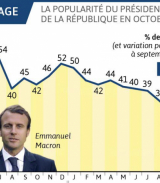 |
« Péripéties » de la présidence Macron : vers un affaissement ou un rebond ?
Foreign Policy Research Institute
27 nov, 2018
Après une première année plutôt réussie, le président français traverse, depuis des mois, une bien mauvaise passe. Certes, il fait toujours d’aussi beaux discours, sur la France, sur l’Europe, sur l’ordre international, et il est toujours beaucoup apprécié à l’étranger comme le défenseur du multilatéralisme (à l’ONU), de l’environnement (récemment sacré « champion de la Terre »), et de l’orthodoxie économique (le FMI et l’OCDE se félicitent tous les deux de ses réformes d’inspiration libérale). En revanche, « son peuple », comme il désigne ses concitoyens dans les médias étrangères, paraît aujourd’hui beaucoup moins enthousiaste.
|
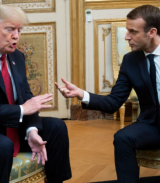 |
La brouille Macron-Trump sur « l'armée européenne »
Notes d’actualité, 22 nov, 2018
La querelle d’un bluffeur et d’un bouffon autour d’une idée loufoque. On pourrait caricaturer ainsi la polémique qui s’est déroulée, à coups d’interviews et de tweets, entre les présidents français et américains après que le premier a évoqué le fumeux concept d’une soi-disant armée européenne. Difficile de dire ce qui a pu passer par la tête du chef de l’Etat, sachant que s’il y a un pays pour lequel la mise en commun des forces européennes signifierait une perte nette, pour ne pas dire désastre fatal, c’est bien la France. Sans doute en est-il conscient, auquel cas il a dû trouver que le plus grand mérite de ce concept est justement qu’il n’a aucune chance. Et qu’il irrite, au passage, le président Trump.
|
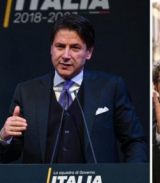 |
Gouvernement « populiste » en Italie : catastrophe ou catalyseur utile ?
Foreign Policy Research Institute
21 juin, 2018
L’entrée en fonction du nouveau gouvernement italien fut accueillie, dans les milieux financiers, médiatiques et par la plupart des dirigeants européens avec un mélange d’inquiétude et d’indignation. Comment l’Italie, un des pays fondateurs de l’Union, son lieu de naissance de par le traité de Rome, a-t-elle pu porter au pouvoir des forces eurosceptiques, antisystème, susceptibles de mettre en péril l’euro, et de créer des tensions sans précédent au sein de l'UE ?
|
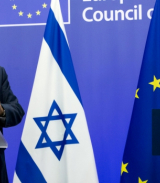 |
Jérusalem : le président Trump met au défi les réflexes « pavloviens » des Européens
Foreign Policy Research Institute
18 mai, 2018
Avec la reconnaissance de Jérusalem comme capitale d’Israël et la décision d’y transférer l’ambassade US, le président Trump a fait un premier pas pour briser l’un des réflexes les mieux ancrés des Européens. Car, comme l’avait remarqué l’ancien commissaire européen Chris Patten, sur le dossier proche-oriental en particulier « le principal déterminant du comportement politique de l'Europe » a été jusqu’ici « le refus pavlovien de toute ligne de conduite qui pourrait éloigner l'Europe des Américains ».
|
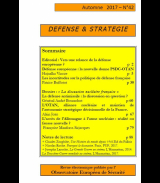 |
Défense européenne : la nouvelle donne PSDC-OTAN
Défense & Stratégie, Automne 2017, n°42, pp. 5-29
05 déc, 2017
Les turbulences dans le ciel européen et transatlantique durant l’année qui vient de s’écouler n’ont évidemment pas été sans incidence sur la cohabitation entre la Politique de sécurité et de défense commune (PSDC) de l’Union Européenne (UE) et l’Alliance atlantique. Les langues se délient, les initiatives se multiplient, de nouvelles perspectives semblent s’ouvrir et provoquent des contrecoups puissants. Quoi qu’il en soit, l’issue va dépendre, une fois de plus, des choix et de la détermination de la France.
|
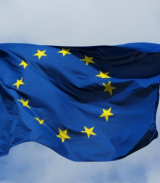 |
Drapeau européen : symbole d’une « allégeance » ou d’un « lien »?
Notes d’actualité, 30 nov, 2017
Au sommet de mi-octobre de l’UE à Bruxelles, le président Macron s’est associé à la Déclaration n°52, dix ans après l’adoption du traité de Lisbonne où la France avait décidé de ne pas signer ladite déclaration.[1] Si le chef de l'Etat a fait le choix de revenir sur cette décision aujourd'hui, c’est avant tout en réponse à l’appel du leader de la France Insoumise, Jean-Luc Mélenchon, qui réclamait le retrait du drapeau européen à l’Assemblée nationale. Certes, la Déclaration n’est pas légalement contraignante, mais sa signature n’en devrait pas moins affirmer, d’après le Président,[2] « l’attachement » de la France aux symboles de la construction européenne. Sauf que la nature de cet attachement peut être très différente selon que l’on se réfère à la version française ou anglaise du texte originel.
|
 |
Le numéro d'équilibriste du président Macron
Lecture at the Princeton Committee of FPRI
26 oct, 2017
Au cours des cinq prochaines années, le principal défi dans le domaine intérieur sera le sentiment d'aliénation dont souffre une écrasante majorité de la population. Il vient d’un côté de la fracture entre gagnants et perdants de la globalisation et, de l’autre, des réactions face à ce qui est largement perçu comme une présence de plus en plus vindicative de l’islam sur le territoire national. Sur le plan européen, il existe, certes, une fenêtre d'opportunité sans précédent pour le projet d’une Europe protectrice, stratégique et autonome, défendu par la France depuis toujours, mais la seule solution pour y parvenir reste la mise en œuvre, enfin, de l’intégration à géométrie variable.
|
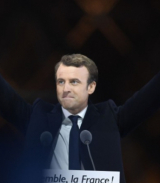 |
La France du président Macron : avis de tempête à l’intérieur et croisée des chemins à l’extérieur
Foreign Policy Research Institute, E-Notes
10 mai, 2017
« On ne sort de l'ambiguïté qu'à son détriment », cette maxime souvent répétée par l’ancien président François Mitterrand sonne comme une mise en garde prémonitoire au lendemain de l’élection d’Emmanuel Macron en France. En effet, les inévitables clarifications risquent d’être particulièrement compliquées pour un président dont la tournure « mais en même temps » est devenu comme une marque de fabrique de sa campagne.
|
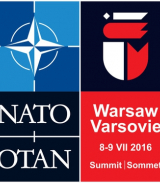 |
Après Varsovie : l’OTAN au sommet de ses contradictions
Défense & Stratégie n°40, automne 2016
19 déc, 2016
Au sommet de l’OTAN à Varsovie, l’objectif affiché était de démontrer, comme le dit le dernier paragraphe du communiqué final, « notre unité, notre solidarité et notre force ». Or sur chacun des trois points, il demeure de sérieux doutes. Qu’il s’agisse de l’unité (faire front commun face aux menaces), de la solidarité (une attaque contre l'un des membres est considérée comme une attaque contre tous) ou de la force (sur ses volets anticipation, décision, action), l’attitude des alliés témoigne de profondes contradictions.
|
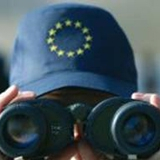 |
Les points de blocage lancinants de l’Europe de la défense
Note IVERIS
14 déc, 2016
"Jamais depuis le lancement de la défense européenne les circonstances ne lui ont été aussi favorables qu’aujourd’hui. Le vote du Brexit a mis sur la touche les éternels poseurs de veto britanniques, et l’élection de Donald Trump à la présidence des Etats-Unis a brusquement mis en lumière les incertitudes liées à une posture de dépendance et de suivisme. Qui plus est, ces deux événements majeurs surviennent dans un contexte où déjà tout plaidait pour une véritable prise en compte des enjeux de sécurité et de défense par les Européens."
|
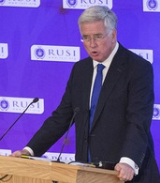 |
Les Britanniques commencent à se poser des questions sur leur relation spéciale avec l'Amérique
Note IVERIS
11 déc, 2016
Illustration parfaite d’un alignement des planètes favorable, comme jamais jusqu’ici, à l’Europe de la défense [1], même les Britanniques commencent à s’inquiéter de leur dépendance. Dans une ambiance européenne générale où, sur le plan rhétorique au moins, les tabous de toujours sont levés les uns après les autrse (tels le concept d’autonomie stratégique, la défense collective, le noyau dur d’Etats membres, le quartier général permanent, ou l’implication de la Commission dans le secteur militaire), un tel début de prise de conscience outre-Manche ne serait pas totalement dénué d’intérêt.
|
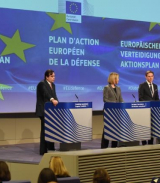 |
La Commission change, timidement, de logiciel sur la défense
Note IVERIS
03 déc, 2016
Avec son Plan d’action européen de la défense, la Commission de Bruxelles amorce un véritable changement de paradigme, à triple titre. La grande nouveauté, c’est la mise à disposition de financements communautaires pour soutenir la recherche et des programmes militaires. Qui plus est, sur deux autres sujets controversés, atlantisme vs. autonomie et ouverture sans limites vs. politique industrielle, elle opère des infléchissements dans un sens positif: vers (un peu) plus d’autonomie et (un peu) plus de politique. Mais elle refuse toujours obstinément d’aller au bout de sa logique.
|
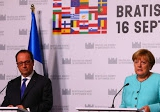 |
Défense européenne : « c’est parti » ?
Note IVERIS
20 sept, 2016
Interrogé le jour du sommet informel de l’UE à Bratislava, le 16 septembre, le ministre des affaires étrangères français assure : « on est en train d’avancer sur une politique commune de défense ». A la remarque sceptique qui s’en est suivie pour noter qu’il y a maintenant vingt ans que l’on en parle, de cette Europe de la défense, Jean-Marc Ayrault répond, apparemment sûr de lui : « Oui, mais ça y est, c’est parti ». Que son optimisme soit fondé ou pas, une chose est certaine : la défense européenne n’a jamais bénéficié d’une constellation aussi favorable que ces jours-ci.
|
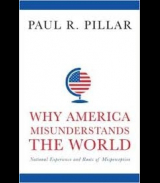 |
Pourquoi l'Amérique comprend mal le monde, de Paul R. Pillar (Note de lecture)
Note IVERIS
11 sept, 2016
A l’approche de la présidentielle US, il n’est sans doute pas inutile de méditer sur l’exceptionnelle continuité de la politique étrangère américaine, que ce soit entre George W. Bush et Barack Obama ou entre William (Bill) Clinton et Ronald Reagan. Certes, la première marque de la politique étrangère d’une grande puissance est toujours ses invariables, quels que soient les hommes et les circonstances. Cela étant dit, l’Amérique est un cas à part. Elle se caractérise à la fois par une vision déformée de son rapport avec le « reste du monde » et par une incapacité flagrante à corriger cette déformation initiale, qui découlent, toutes les deux, directement de sa géographie et de son histoire.
|
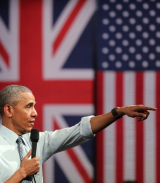 |
Brexit : un coup de poignard dans le dos des Etats-Unis
Note IVERIS
02 juil, 2016
Au lendemain du référendum britannique, le vice-président américain, Joe Biden s’est exprimé en disant : « Nous aurions préféré un résultat différent ». Quelques jours après, le Secrétaire d’Etat Kerry estime qu’il n’est toujours pas impossible de revenir en arrière. En effet, au cours des six dernières décennies, l’Amérique avait fait des pieds et des mains pour obtenir, puis perpétuer la présence de son allié préféré au sein de la construction européenne. La raison en est simple. Comme l’explique l’ambassade US à Londres, « l’Union européenne est l’organisation la plus importante du monde dans laquelle l’Amérique n’a pas de place à la table ». Pour y faire entendre sa voix, il a donc besoin d’un cheval de Troie ou, en termes diplomatiques, « l’expression dans l’UE de l’approche commune américano-britannique grâce au statut de membre du Royaume-Uni ». Sauf que les électeurs britanniques viennent d’opter pour la sortie…
|
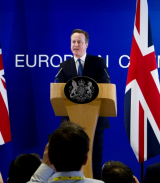 |
Le statut très spécial du Royaume-Uni
Note IVERIS
23 févr, 2016
A l’issue du sommet de l’UE des 18-19 février, destiné à trouver un arrangement qui satisfasse les exigences posées par Londres, en vue du référendum sur la sortie britannique de l’Union, le Premier ministre Cameron s’est targué d’avoir arraché un accord qui « allait donner un statut spécial » au Royaume-Uni. Au même moment, le président français a rappelé que, de par ses nombreuses exemptions, l’Angleterre « a toujours eu une place particulière en Europe ». C’est exact. Toutefois, la vraie spécificité des Britanniques à l’intérieur de l’UE aujourd’hui réside dans la prédominance idéologique de leur ligne résolument atlantiste et libre-échangiste.
|
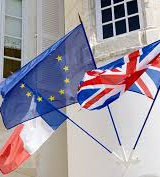 |
Au-delà de la question du Brexit
Note IVERIS
18 févr, 2016
En 1975, au moment du premier référendum britannique sur la question de savoir si l’Angleterre devait rester ou pas dans ce qui était alors les Communautés européennes, une caricature du Canard enchaîné dessina le Premier ministre Harold Wilson au lit, sur une Europa manifestement ennuyée qui l’implorait : « Entrez ou sortez, mon cher Wilson, mais cessez ce va-et-vient ridicule ». C’était il y a plus de quarante ans… Quatre décennies durant lesquelles l’Angleterre a soigneusement gardé sa position « semi-détachée de l’Europe », pour citer l’ancien Commissaire britannique, Chris Patten...
|
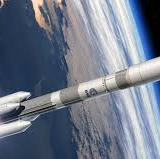 |
Ariane 6 : le début de la fin pour l’industrie spatiale européenne ?
Note IVERIS
01 janv, 2016
Atout stratégique par excellence, le lanceur Ariane est le symbole même de l’Europe spatiale. Fait plutôt rare, c’est un succès à la fois politique, technologique et commercial. Or il risque aujourd’hui d’être détricoté, suite à un transfert inédit de contrôle et de compétences de l’Etat vers des industriels privés.
|
 |
Suite aux attentats de Paris, l’Europe de la défense renaîtra-t-elle de ses cendres ?
Note IVERIS
18 nov, 2015
En évoquant à Versailles, pour la première fois dans l’histoire, la clause de défense mutuelle de l’UE, le Président François Hollande a donné un coup de fouet formidable à la défense européenne. Au vu de l’extraordinaire emprise des Etats-Unis et de l’OTAN sur la sécurité en Europe, il s’agit d’un véritable coup de force. Dans la foulée, la Haute Représentante de l’Union européenne lui a emboîté le pas sans hésiter.
|
 |
Les USA vont-ils pouvoir engager les troupes de l’OTAN ?
Note IVERIS
10 nov, 2015
Peu évoqué en public, l’un des dossiers les plus déterminants pour l’avenir de l’OTAN concerne la proposition américaine qui souhaiterait que le Commandant suprême US soit investi de l’autorité de déployer, de son propre chef, les troupes de l’Alliance. A la conférence de Riga, cette question d’habitude présentée de façon délibérément ambiguë, a donné lieu à des clarifications édifiantes.
|
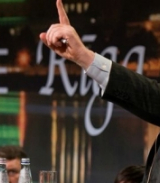 |
Une OTAN très combative à la Conférence de Riga
Note IVERIS
07 nov, 2015
Le premier panel de discussion de la Conférence de Riga, intitulé « L’OTAN défenseur de la stabilité globale », n’a laissé aucun doute sur les préférences des participants. Que ce soit un général britannique ancien Commandant suprême adjoint de l’Alliance, le M. Sécurité de la Fondation Adenauer en Allemagne, un ancien ambassadeur américain à l’OTAN, ou le Secrétaire d’Etat du ministère de la Défense de la Lettonie, ils sont tous pour une approche dure vis-à-vis de la Russie. Leur unique réserve par rapport à la politique actuelle des Etats-Unis et de l'OTAN est qu’elle ne s’affirme pas avec une fermeté suffisante.
|
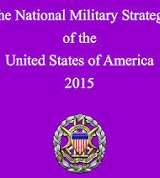 |
L’Amérique craint pour « son » ordre mondial
Note IVERIS
29 sept, 2015
Un récent rapport du Service de recherche du Congrès américain (CRS) se penche sur le « Changement dans l’environnement international de sécurité et les potentielles implications pour la défense ». Les formules de prudence cachent à peine que, d’après le rapport, une mutation a bel et bien eu lieu, marquée par la « tactique du salami » (tranche après tranche) pratiquée par Pékin en Mer de Chine orientale et la « guerre hybride » menée par la Russie en Ukraine. Cette nouvelle donne sécuritaire se caractérise par « le renouvellement de la compétition entre les grandes puissances » et « la remise en cause de certains éléments de l’ordre mondial dominé par les Etats-Unis ».
|
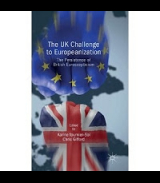 |
La dimension transatlantique de l'euroscepticisme britannique
The UK Challenge to Europeanization (ed. K. Tournier-Sol - C. Gifford)
16 sept, 2015
La dynamique des relations entre le Royaume-Uni et l’Union européenne ne peut être appréhendée dans sa totalité et dans sa spécificité sans prendre en compte le rôle déterminant qu’y jouent les Etats-Unis, à travers notamment les relations que Londres voudrait croire « spéciales ». Que ce soit de manière directe, indirecte, voire parfois paradoxale, le tropisme américain/atlantiste de l’establishment politico-médiatique britannique est en arrière-fond d’une bonne partie de leurs positions considérées comme sceptiques, ou même carrément hostiles envers de la construction européenne.
|
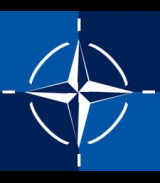 |
L’OTAN cherche à contourner la règle du consensus
Note IVERIS
25 aout, 2015
Le jour s’approche-t-il où l’Amérique pourra, de son seul fait, entraîner l’ensemble de l’OTAN dans une guerre ? La question n’est hélas pas aussi surréelle qu’elle n’y paraît. A la réunion ministérielle de l’Alliance, fin juin, le SACEUR (commandant suprême) « a reçu l’autorité d’alerter, de mobiliser et de préparer les troupes » de son propre chef, en attendant le feu vert du Conseil pour le déploiement sur le terrain. Mais soyons réalistes : les troupes déjà sur le tarmac, les avions prêts à décoller, les tambours battants – difficile d'imaginer comment un Etat membre réticent oserait, à ce stade, monter au créneau pour arrêter la machine de guerre de l’Alliance.
|
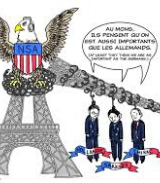 |
A la réunion de l’OTAN, bon courage pour parler de renseignement
Notes d’actualité, 24 juin, 2015
L’ambiance n'est pas assurée, pour la réunion ministérielle de l’Alliance atlantique aujourd'hui. Le moins que l’on puisse dire, c’est que la démonstration prévue de la parfaite unité transatlantique est quelque peu entachée par les toutes récentes révélations de Wikileaks sur l’espionnage américain contre trois présidents de la République successifs. L’actuel chef de l’Etat y compris.
|
 |
La « guerre hybride » tombe à pic
Notes d’actualité, 18 mars, 2015
La dernière Lettre de la Représentation militaire de la France à l’UE aborde le concept de la « guerre hybride » (très en vogue à la suite de la crise russo-ukrainienne, comme si on venait de découvrir qu'une guerre se conduit sous des formes multiples, dans des dimensions à la fois militaires et civiles). La conclusion que l’on en tire est édifiante à plus d'un titre.
|
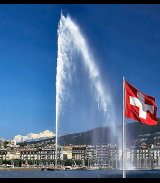 |
Coup d'oeil sur le dilemme contre-terrorisme vs droits de l'homme
International conference on human rights and counter-terrorism, Geneva
16 févr, 2015
À la lumière des récentes attaques terroristes en Europe, la controverse sur la façon de trouver le juste équilibre entre la « lutte contre le terrorisme » et le respect des droits de l'homme, pourrait bien revenir au centre de l’attention. L'Union européenne et ses États membres sont l'un des plus proches alliés des États-Unis : la coopération va bien au-delà du cadre traditionnel de l'OTAN, et se prolonge dans la lutte contre le terrorisme, à la fois sur une base bilatérale et multilatérale. Dans le même temps, l'Europe a été résolument et systématiquement sceptique quant à la ligne de conduite adoptée par les Etats-Unis à la suite du 11 septembre.
|
 |
Armes létales et « unité occidentale »
Notes d’actualité, 04 févr, 2015
Armer ou ne pas armer l’Ukraine ? Telle est la question suspendue comme une épée de Damoclès au-dessus de la tête des ministres de la défense de l’OTAN qui se retrouveront demain 5 février pour discuter de leur fameux « plan de réactivité ». Les uns et les autres ont commencé à poser leurs jalons à la veille de la réunion. Or il est impossible d’ignorer le potentiel de désordre, au sein du soi-disant Occident, que comporte cette interrogation sur d'éventuelles livraisons.
|
 |
L'Amérique piégée par ses propres « récits »
Notes d’actualité, 03 févr, 2015
Le discours américain au sujet des adversaires (réels ou potentiels) a toujours tendance à osciller entre deux extrêmes. Tantôt c'est l'exagération exponentielle de la menace, tantôt c'est le dénigrement complet et le mépris total. Ce qui fait la particularité de l'attitude US, c'est que pour souligner tel ou tel point, ils sont prêts à combiner les deux - un exercice pour le moins délicat. Pour preuve : interviewé sur CNN et parlant de la crise russo-ukrainienne, le président Obama vient de le rater avec fracas.
|
 |
La CIA aime travailler en Europe: c'est facile, c'est chic et on reste entre amis
Notes d’actualité, 28 déc, 2014
La CIA forme ses agents à déjouer les contrôles de sécurité aux frontières de l’UE, d’après les manuels de l’Agence de renseignement US publiés par Wikileaks. Comme le note celui-ci, les documents, datés de 2011 et 2012, « prouvent que l’administration Obama et la CIA continuent de vouloir infiltrer les frontières de l’Union européenne, en conduisant des opérations clandestines sur le sol européen ». Sans surprise, ils sont classés « NOFORN » (pour no foreigners), autrement dit à ne pas partager avec les services d’espionnage alliés.
|
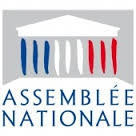 |
La France, quel gardien du temple pour l'Europe de la défense?
Notes d’actualité, 20 nov, 2014
« C’est la PSDC – ou vivre dans un monde dirigé par d’autres », ce constat limpide fut la réplique de l’ancien patron de l’Agence européenne de défense, Nick Witney, à un article qui préconisait d’oublier la PSDC (la politique de sécurité et de défense commune de l’UE) et de nous en remettre plutôt à la seule Alliance atlantique. Le constat est à moitié exact. L’enjeu, c’est en effet la sauvegarde (ou pas) de notre liberté de choix. Mais faire de la PSDC le dépositaire de cette ambition, ce serait ignorer profondément son évolution.
|
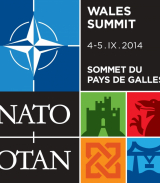 |
L'Alliance atlantique face à la crise ukrainienne (Bilan du sommet de l OTAN au pays de Galles)
Défense & Stratégie n°36, automne 2014
13 nov, 2014
Quelques extraits de l’article « L’Alliance atlantique face à la crise ukrainienne : la réatlantisation de l’Europe (Blian du sommet de l'OTAN au pays de Galles) », qui vient de paraître dans la Revue Défense & Stratégie.
« D’après le discours officiel, le sommet de 2014 de l’Alliance aurait « largement changé d’orientation » à la suite de la crise russo-ukrainienne. En réalité, chacune des supposées nouvelles orientations, chacun des soi-disant changements (tous liés, d’une manière ou d’une autre, au retour en force de la défense collective à travers l’article 5) n’est que la reprise de thèmes et la réaffirmation de priorités qui avaient été prévus depuis longtemps. »
|
 |
Un pour tous, tous pour un ? (Partie 2 : interrogations dans l'Alliance)
Notes d’actualité, 29 oct, 2014
Au dernier sommet de l'OTAN, la défense collective a fait un « comeback » fracassant, la crise russo-ukrainienne aidant. Certes, ce fut déjà inscrit au programme depuis deux ou trois ans. Avec la baisse sensible de l’appétit pour les exploits extérieurs (peu populaires, trop coûteux, entraînant des résultats politiques pour le moins douteux), et la nécessité de rassurer les nouveaux alliés, particulièrement angoissés après l’annonce du « pivot » américain, l’Alliance devait, de toute façon, dépoussiérer son article 5. Ce qu’elle était en train de faire. Mais rien ne vaut un petit affrontement bien pimpant avec la Russie, pour donner un coup de pouce en la matière.
|
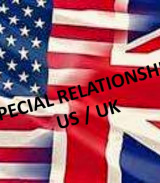 |
Petites perles de la relation (très) spéciale UK-USA
Notes d’actualité, 02 oct, 2014
Observer de près la bien-nommée relation spéciale entre la Grande-Bretagne et l’Amérique est divertissant à plusieurs titres. Outre le spectacle hallucinant de la dépendance extraordinaire dans laquelle les vaillants Britanniques se sont enfermés au fil du temps, le sujet apparaît à la fois comme une échappatoire bienvenue et comme une mise en garde édifiante.
|
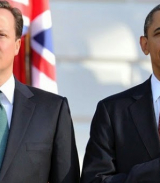 |
Vive l'Ecosse libre?
Notes d’actualité, 18 sept, 2014
Une Ecosse indépendante ? On n'en veut surtout pas, à en juger par la panique qui s’est emparée ces derniers temps des élites « occidentales ». A mesure que les indépendantistes montaient dans les sondages, certains n’ont pas été avares de pressions et de (plus ou moins) subtiles mises en garde.
|
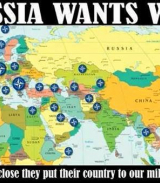 |
OTAN/US : bases permanentes à l’Est ?
Notes d’actualité, 31 mai, 2014
Le ministre polonais des Affaires étrangères n’y va pas par quatre chemins. Dans un récent article du Spiegel allemand, sur l’insuffisante préparation de l’Alliance face à une hypothétique invasion russe, Radek Sikorski fait remarquer : « Il y a des bases au Royaume-Uni, en Espagne, en Allemagne, en Italie et en Turquie. Mais il n’y a aucune base là où on en a besoin ». En avant donc, pour des bases permanentes en Pologne et dans les Etats baltes. Après tout, quoi de mieux pour promouvoir la désescalade?
|
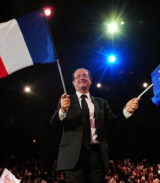 |
L’Europe du Président Hollande
Notes d’actualité, 16 mai, 2014
La tribune du chef de l’Etat à l’occasion de l’anniversaire de la fin de la Seconde guerre mondiale en Europe (et à quinze jours des élections européennes) laisse doublement à désirer. D’une part le raisonnement qui y est exposé manque parfois de cohérence. De l’autre, il ne va pas jusqu’au bout de la partie non-exposée de son raisonnement.
|
 |
Un pour tous, tous pour un ? (Partie 1 : l’OTAN et ses garanties en trompe-l’œil)
Notes d’actualité, 13 mai, 2014
Conséquence immédiate de la crise en Ukraine : la « défense collective » a le vent en poupe. L’un des mythes les plus soigneusement entretenus des relations transatlantiques et, par là même, l’un des tabous les plus persistants de la défense européenne, le concept d’assistance militaire mutuelle a été propulsé sur le devant de la scène. Il serait donc temps de le regarder d’un peu plus près.
|
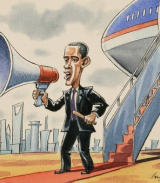 |
Obama sur la corde raide, entre l'Europe et l'Asie
Notes d’actualité, 24 avril, 2014
C’est un vrai numéro d’équilibriste que le président Obama tente de réussir entre ses alliés en Europe d’un côté, et ceux en Asie de l’autre. Le voilà donc en pleine crise ukrainienne, parti faire une tournée pour rassurer ses partenaires asiatiques que le pivot vers eux existe bel et bien - le contraire du message que l’administration US s’efforce d'envoyer à ses alliés européens.
|
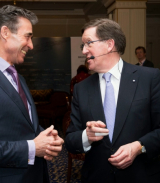 |
Crise en Crimée : l’OTAN saute sur l’opportunité
Notes d’actualité, 24 mars, 2014
Le Secrétaire général de l’Alliance atlantique a du mal à cacher son soulagement. Enfin, à la dernière minute, voici tombée du ciel la raison d’être tant recherchée pour l’OTAN post-Afghanistan. Face à l’ogre russe, vite, il faut se ranger en ordre de bataille. Peu importe si ça fait un peu réchauffé. L’essentiel, c’est que la crise en Ukraine devrait nous aider à en finir, une fois pour toutes, avec les hésitations et les états d’âme qui menaçaient, ces derniers temps, de remettre sérieusement en question l’avenir de « l’Alliance la plus réussie de l’Histoire ».
|
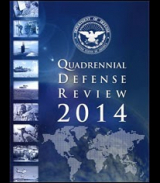 |
Analyse à chaud : Quadrennial Defense Review 2014
Notes d’actualité, 06 mars, 2014
Le voilà, le tout nouveau Quadrennial Defense Review du Pentagone, prêt à être disséqué par les alliés anxieux de voir s’ils sont toujours dans les bonnes grâces de Washington. De ce point de vue, le document est dans la droite lignée de la rhétorique-tactique des responsables US, telle qu’elle fut exposée lors de la Wehrkunde (Conférence sur la sécurité annuelle à Munich) de février dernier. L’Amérique y souffle le chaud (tout en fanfare) et le froid (en catimini). Convaincue, à juste titre, que c’est la meilleure manière de rendre les Européens toujours plus dociles.
|
 |
Crise ukrainienne : petite mise au point préalable
Notes d’actualité, 03 mars, 2014
C'est ce qui s'appelle un timing parfait. Une mission d’information de l’Assemblée nationale vient de présenter les résultats de ses travaux au sujet de « la politique française et européenne vis-à-vis de la Russie ». Voici quelques extraits relatifs à l’Ukraine, tirés du Rapport d’information, et de l’audition des auteurs (Chantal Guittet et Thierry Mariani) qui s’en est suivie. En y ajoutant, sans surprise, une petite touche transatlantique.
|
 |
Pacte Défense Cyber : gare aux alliances !
Theatrum Belli
02 mars, 2014
Le Ministère de la défense a présenté récemment son « Pacte Défense Cyber », un plan d’action en 50 points pour cadrer ses actions en matière de cyberdéfense. Jusqu’ici, rien de plus normal, il s’agit évidemment d’un enjeu d’importance cruciale. Toutefois, ce qui retient immédiatement l’attention, c’est la tension (voire contradiction) entre d’une part l’impératif de souveraineté dans ce domaine hautement stratégique et, de l’autre, l’insistance du Pacte sur des cadres de coopération internationale où, c’est le moins que l’on puisse dire, les partenaires de la France ne partagent pas forcément ce souci.
|
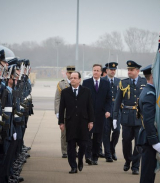 |
L’Europe de la défense, éternelle pomme de la discorde entre la France et le Royaume-Uni
Notes d’actualité, 31 janv, 2014
Au récent sommet franco-britannique, en plein milieu des annonces concernant la coopération militaire bilatérale, le président Hollande a frôlé le crime de lèse-majesté, en osant prétendre que « Le drone de combat préfigure ce que pourrait être une Europe de la défense ». Pour les Britanniques, coopérer, pourquoi pas, mais n'évoquons surtout pas l'Europe, et en particulier pas en l'associant aux questions de défense.
|
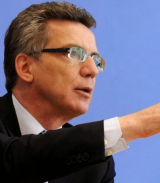 |
Pied de nez allemand à la France et à la Grande-Bretagne? – effet boomerang
Notes d’actualité, 09 janv, 2014
En Allemagne, le ministre sortant de la défense se lâche… D’après Thomas de Maizière, Berlin n’a pas de leçon à recevoir de quiconque, même pas de Paris ou de Londres, concernant la nature et le volume de ses déploiements militaires hors de ses frontières. Et, pour appuyer ses propos, il n'hésite pas à envoyer quelques piques à l’adresse de ses partenaires.
|
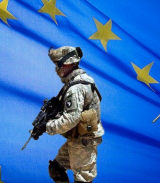 |
Pente glissante : la réatlantisation de l Europe de la défense
The Federalist Year LV, 2013
31 déc, 2013
La réatlantisation de l’Europe de la défense est en marche.[1] Que ce soit la crise en Ukraine, offrant visiblement un formidable prétexte aux efforts de rebond de l’OTAN ; ou notre inexorable enfermement dans le piège de la coopération avec l’Amérique en matière d’armement ; ou les pressions qui s’accentuent pour civilianiser la PSDC y compris ses groupements tactiques ; ou encore le nouveau discours de symbiose transatlantique ; il s’agit à chaque fois de manifestations palpables d’un choix délibéré de la part des élites euro-occidentales. Un choix qui va pourtant à contre-courant de ce que dicteraient les événements, le bon sens, nos intérêts et notre dignité. Sans parler du désir (assez peu perceptible, il faut le dire) de tenir, tant bien que mal, notre place dans la « mêlée mondiale »
|
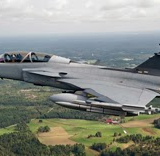 |
Le Gripen au Brésil: un choix pro-américain faute de mieux ?
Notes d’actualité, 21 déc, 2013
Avec le Gripen, le Brésil se résigne à acheter américain, par la petite porte. Peut-être aussi parce qu’il estime ne pas avoir d’autre option, en fin du compte ? Pour rappel, près d'un cinquième des composants de l’avion suédois proviennent des Etats-Unis. Ce qui fut clairement un argument de vente en Europe centrale, dans des pays notoirement pro-américains. Ainsi s’y soulignait-on avoir choisi un appareil dont la turbine est à 60% fabriqué par General Electric, dans l'espoir d’atténuer l’offense faite à l’allié US qui avait employé les grands moyens pour vendre ses F-16.
|
 |
Une Ecosse indépendante non-nucléaire dans l’OTAN ?
Entretien à BBC Radio l’émission 5 Live Drive
20 nov, 2013
En quoi la posture antinucléaire du SNP (Scottish National Party) devrait-elle constituer un problème pour une Ecosse indépendante mais soucieuse de garder sa carte de membre à l’OTAN ?* En pas grand-chose, pour faire bref. Le fait d’exiger le retrait des armes nucléaires UK de son territoire et de se proclamer Etat non nucléaire n’est pas a priori en contradiction avec le statut de membre de l’OTAN. Pour rappel : à présent 20 pays membres sur les 28 ne possèdent ni n’hébergent d’armes atomiques sur leur sol.
|
 |
NSA/Europe: Ordre dans le désordre
Theatrum Belli
31 oct, 2013
Ces derniers jours, l’enchaînement d’accusations, de suspicions, de démentis et de révélations à répétition fait que l’on a l’impression d’être devant une affaire aussi complexe qu’impénétrable. Alors qu’au fond elle est plutôt simple. S’y superposent, en réalité, deux affaires. Celle du transfert de données vers l’Amérique par des pays européens, dans le cadre de leurs accords bilatéraux de coopération avec Washington en matière de renseignement. Et celle de la surveillance/espionnage que mènent les Etats-Unis pour leur propre compte, contre ces mêmes pays européens.
|
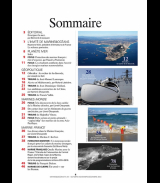 |
Les forces navales européennes, entre éclipse et dépendance ?
Marine&Océans n°241, automne 2013
22 oct, 2013
Le think-tank néo-conservateur American Enterprise Institute vient de publier un rapport particulièrement dense (1) analysant l’évolution des principales marines européennes, sous le titre « L’OTAN en mer : tendances concernant la puissance navale des alliés ». Ses conclusions sont limpides : les marines française, britannique, espagnole et italienne (l’Allemagne étant considérée comme un cas à part) sont toutes confrontées à cet exercice délicat qui consiste à réduire leur format tout en essayant de préserver, dans la mesure du possible, une certaine polyvalence.
|
 |
Analyse à chaud : le rapport Ashton sur la défense européenne 3. (propositions concrètes, opérations militaires)
Notes d’actualité, 17 oct, 2013
Les mesures concrètes proposées dans le rapport Ashton afin d’améliorer la capacité de réaction rapide de l’UE aux crises ne sont guère surprenantes. Par contre un seul élément, le plus important, surprend par son absence. Il s’agit du vieux serpent de mer du Quartier général militaire européen (pour la planification et la conduite des opérations UE), dont la nécessité est aujourd’hui reconnue de tous, sauf le Royaume-Uni qui en fait sa ligne rouge. Le rapport n’en dit même pas un mot. Or s’il y a une mesure susceptible à la fois de réduire le temps de réaction aux crises, d’assurer la continuité, de permettre un véritable retour d’expérience et de supprimer les doublons entre 5 structures nationales différentes ; cette mesure est bien celle-là. Dommage de la passer sous silence.
|
 |
Analyse à chaud : le rapport Ashton sur la défense européenne 2. (relations UE-OTAN)
Notes d’actualité, 16 oct, 2013
Le paragraphe consacré aux relations UE-OTAN est un classique du genre. Il préconise toujours plus de coopération, en tissant des liens toujours plus étroits entre l’UE et l’Alliance. Ce qui n’est pas un mal en soi. Sauf quand on connaît ce qu'il y a derrière ces formules toutes faites. Rappelons qu’au lancement de la PSDC (la politique de sécurité et de défense commune de l’UE), la France était extrêmement vigilante à ne pas laisser « la fleur délicate de la défense européenne se faire écraser dans une embrassade avec le géant militaire qu’est l’OTAN ». A l’époque, même une étude du Center for European Reformbritannique admet, tout en prêchant pour l’inverse, que « les inquiétudes françaises vis-à-vis des priorités US ne sont pas complètement sans fondement ».
|
 |
Le rapport Ashton sur la PSDC: à la fois trop ambitieux et pas assez
Notes d’actualité, 16 oct, 2013
On dit souvent de la défense européenne qu’elle est en hibernation depuis un bon moment. Eh bien, elle ferait mieux d’y rester, plutôt que d’être ressuscitée sur la base du rapport que la Haute représentante vient de présenter en vue du sommet de décembre. Car ledit rapport essaie de cacher son manque d’ambition réelle pour la PSDC (politique de sécurité et de défense commune de l’UE) derrière des initiatives qui, dans ce cadre, ne pourront faire que des dégâts. Mais soyons justes. Accordons-lui au moins d’avoir fait le bon constat. En effet, les trois explications que le rapport avance au départ pour justifier l’importance des efforts de défense sont tout à fait valables (à savoir l’aspect politique pour ce qui est du rôle de l’Europe sur la scène mondiale ; opérationnel quant à disposer de la capacité militaire d’agir le cas échéant ; économique enfin pour soutenir l’innovation, l’emploi et la croissance).
|
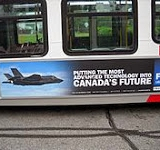 |
Le syndrome JSF au Canada
Notes d’actualité, 12 oct, 2013
Le Canada espère remédier aux anomalies de son système d’acquisition d’équipements militaires grâce à des réformes organisationnelles. On lui souhaite bon courage. Sachant qu’il ne peut s’agir que d’améliorations de façade. Car la centralisation du processus d’acquisition de défense (lequel passe aujourd’hui par trois ministères différents), ne le fera pas sortir du carcan américain pour autant. Sur la base du Defense Production Sharing Agreement de 1956, il s’y est solidement établi une coopération nord-américaine fort déséquilibrée, source de distorsions et d’ennuis constants.
|
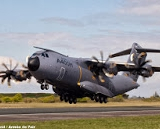 |
L'A400M dans une optique américaine
Notes d’actualité, 02 oct, 2013
Certes les Etats-Unis ne pourront pas ne pas se réjouir officiellement, en voyant leurs alliés commencer à combler l'une des principales lacunes capacitaires qu'ils leur reprochent depuis si longtemps. Mais ce n'est que la façade. L'A400M est un concurrent et un outil d’autonomie européenne comme ils ne les aiment pas. Un article du Washington File du Département d’Etat datant de 2006 précise déjà que « Les US recommandent aux alliés OTAN de mettre en commun de l’argent pour acheter des C-17 ». Une solution présentée comme bénéfique pour les affaires de Boeing et qui serait du même coup la meilleure façon de pallier les carences des Européens en matière de transport stratégique.
|
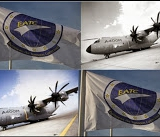 |
L'A400M dans une optique européenne
Notes d’actualité, 02 oct, 2013
Comme l'a dit Hervé Morin, ministre de la défense en 2010: «L'A400M est un programme emblématique sur lequel les Européens ne pouvaient pas renoncer ». En effet, son arrivée signifie plus pour la « défense européenne » que n'importe quelle déclaration pompeuse à l'issue d'une quelconque réunion au sommet. Premièrement, parce que la nouvelle flotte d'avions de transport stratégique (et tactique, l'A400M étant hautement polyvalent) va résorber ce qui fut identifiée comme l'une des lacunes capacitaires majeures de l'Europe de la défense, dès le lancement de celle-ci il y a déjà quinze ans.
|
 |
Le tropisme transatlantique du président d’EADS
Notes d’actualité, 28 sept, 2013
En parlant des perspectives de « l’aéronautique transatlantique », Tom Enders joue cartes sur table maintenant. Dès le départ, son intention d'évincer les Etats européens d'EADS et son désir de le transformer en une compagnie de facto américaine formaient un tout inséparable. C'est logique, ce sont les deux faces de la même médaille.
|
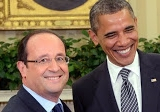 |
Syrie: la France à contre-emploi
Notes d’actualité, 09 sept, 2013
Réduire le capital de sympathie et de respect que la France avait accumulé, de par le monde entier, grâce à l’héritage gaulliste de sa diplomatie, n’est pas chose facile. C’est pourtant ce qui risque d’arriver si le président Hollande ne rectifie pas vite l’image qu’il envoie au sujet de la Syrie.
|
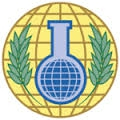 |
Vous avez dit armes chimiques ? – l’Amérique amnésique
Notes d’actualité, 06 sept, 2013
Inutile de répéter tout ce qui a mille fois été dit, à juste titre, sur la barbarie que constitue l’usage d’armes chimiques, et en particulier contre des populations civiles. Impossible, en même temps, de passer à côté de l’imposture des Etats-Unis quand ils dénoncent haut et fort une violation des sacro-saintes normes internationales aujourd’hui.
|
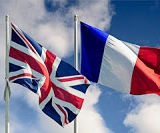 |
Identité européenne: un « malentendu » vieux de quarante ans
Notes d’actualité, 24 aout, 2013
En attendant le sommet « Défense » du décembre prochain, rappelons d’abord un seul petit mot traduit de travers il y a quarante ans, et qui est plus révélateur que des centaines de pages d’études et d’analyses pour expliquer l’impasse de l’Europe de la Défense (et, avec elle, l’impossible émancipation de notre continent).
|
 |
La Commission s'immisce dans les affaires d'armement
Notes d’actualité, 29 juil, 2013
En proposant, le 24 juillet dernier, un plan d’action « visant à accroître l’efficacité et la compétitivité du secteur de la défense », La Commission européenne n’en est pas à son premier essai. Notamment pour se mêler de ce qui ne fut pourtant jamais censé être ses affaires.
|
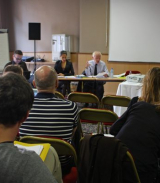 |
Sur la dimension transatlantique de l'euroscepticisme britannique
Séminaire international à l'université de Toulon
09 avril, 2013
La dynamique des relations entre le Royaume-Uni et l’Union européenne ne peut être appréhendée dans sa totalité et dans sa spécificité sans prendre en compte le rôle déterminant qu’y jouent les Etats-Unis, à travers notamment les relations que Londres voudrait croire « spéciales ». Que ce soit de manière directe, indirecte, voire parfois paradoxale, le tropisme américain/atlantiste de l’establishment politico-médiatique britannique est en arrière-fond d’une bonne partie de leurs positions considérées comme sceptiques, ou même carrément hostiles envers de la construction européenne.
|
 |
L’indépendance écossaise et la question de la sécurité transatlantique et européenne
University of Glasgow International Lecture Series
21 mars, 2013
La position particulière du Royaume-Uni dans l’espace de sécurité européenne et transatlantique constituera l’un des premiers éléments déterminants et pour l’attitude des autres Etats face à une éventuelle indépendance écossaise (voudraient-ils ou pas voir Londres s’affaiblir même si juste momentanément), et pour leur appréciation des politiques menées par une Ecosse indépendante (seront-elles en ligne, ou se différencieront-elles, et si oui, sur quels points, des politiques de Whitehall). Dans les deux cas, Londres et non pas Edinburgh sera le point de référence.
|
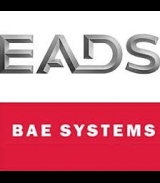 |
Les politiques d’armement en Europe à travers l’exemple de l’affaire BAE Systems-EADS
Défense & Stratégie n°33, automne 2012
15 nov, 2012
La tentative de fusion entre British Aerospace System (BAESystems)[1] et European Aeronautic Defence and Space Company (EADS)[2] a échoué malgré les louanges de la presse et en dépit du soutien que lui apportaient, sous le double slogan de « l’Europe » et de « l’efficacité/rentabilité », à la fois les politiques et le monde des affaires. Cet échec fut-il inéluctable ou le fruit d’un heureux concours de circonstances ? Une chose est certaine : qu’il s’agisse de ses acteurs, de son ambition ou de sa méthode, derrière la prétendue logique d’une telle fusion, transparaissent de toutes autres considérations.
|
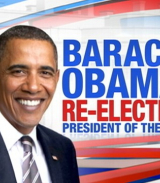 |
L’Europe post-élection… américaine
Theatrum Belli
10 nov, 2012
Que veut dire, pour l’Europe, la réélection de Barack Obama ? Outre la continuité, y aura-t-il plus d’intransigeance sur certains dossiers ou, au contraire, sera-t-il un peu plus attentif aux susceptibilités de ses alliés ? Ce sont le genre de questions avec lesquelles les responsables européens ne cessent de harceler et leurs conseillers et tous ceux qui acceptent de se faire inviter par eux à Washington DC.
|
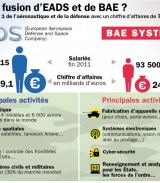 |
L’échec de la fusion BAE-EADS : que reste-t-il après une tentative de trahison ? L’intention…
Theatrum Belli
19 oct, 2012
La faillite du projet de fusion BAE-EADS fut accueillie par un mélange de déception, de tristesse et de noble fureur par la quasi-totalité des commentaires. Déception et tristesse pour l’Europe, supposée être la grande perdante de l’affaire, et fureur contre les Etats égoïstes, qui auraient manqué cette superbe occasion rien que pour satisfaire leurs vilains intérêts. En y regardant de plus près, ce poignant récit devient exactement son inverse. L’Europe devrait être soulagée d’avoir reçu une seconde chance avant de se réveiller un jour pour voir son secteur stratégique télécommandé depuis Washington par le duo Pentagone-Maison Blanche. Et le seul reproche que l’on puisse faire aux gouvernements (à part leurs mobiles, parfois bien piteux au regard des enjeux), c’est qu’ils n’ont pas été plus fermes.
|
 |
Wikileaks - sous un PRISM transatlantique
Notes d’actualité, 16 déc, 2010
L'affaire Snowden/PRISM vient de (re)mettre en lumière tout ce que le scandale Wikileaks autour des câbles diplomatiques US avait déjà confirmé de manière éloquente.
|
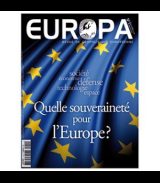 |
Autonomie ou assujettissement : la dimension militaire de l'impératif de souveraineté européenne
Europa, n°1, novembre 2009
15 nov, 2009
Aussi complexe que puisse paraître le sujet indiqué dans le titre, le point de départ de l’analyse peut être réduit à trois constats simples. Dès qu’il s’agit de souveraineté, nos rapports avec l’Amérique sont au cœur du problème. Or, les relations transatlantiques ont pour caractéristique fondamentale la dépendance européenne. Or, l’indépendance est la condition sine qua non de la crédibilité et du libre-arbitre ou, en d’autres termes, de l’existence même au sens géopolitique.
|
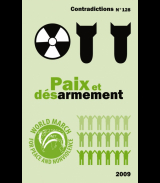 |
Parapluie ou hara-kiri ? – la présence nucléaire américaine en Europe
Contradictions n°128 (Paix et désarmement)
09 oct, 2009
Bien trop souvent, on est tenté d’assimiler la présence nucléaire américaine en Europe à sa seule dimension tangible. A savoir le stationnement de quelques centaines de bombes US sur le sol de cinq pays du continent européen, dans le cadre de l’OTAN et de son soi-disant « partage nucléaire ». Et on a tort de le faire.
|
 |
Le « retour » de la France dans l'OTAN : fausses raisons et vraies conséquences
La Lettre Sentinel n°51, avril 2009
08 avril, 2009
Saluée (ou vilipendée, c’est selon) comme un « retour au bercail », la réintégration des structures militaires intégrées par la France finira-t-elle par faire exploser l’Alliance ? La question n’est paradoxale que d’apparence. A contre-courant des évolutions géopolitiques, basée sur un argumentaire dont la vacuité se manifestera au grand jour avant même qu’on n’ait commencé à changer les enseignes des bureaux et réimprimé les cartes de visite, cette décision (formellement pas encore prise) est surtout perçue et interprétée de manière diamétralement opposée par les protagonistes. D’où les attentes contradictoires, pour ne pas dire incompatibles, des deux côtés.
|
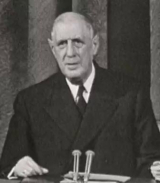 |
Le Général face à l OTAN: une analyse toujours actuelle
La Lettre Sentinel n°51, avril 2009
01 avril, 2009
Une des formules récurrentes dans les discussions sur le plein retour de la France à l’OTAN, quoique admise de tous côtés comme une évidence, mérite néanmoins que l’on s’y arrête un instant. Il s’agit du contexte géostratégique qui aurait subi, paraît-il, d’énormes changements. De prime abord, c’est un truisme: l’URSS a disparu, la guerre froide est terminée, l’Europe de la Défense créée – si bien que le Général de Gaulle et ses chamailleries avec l’OTAN semblent résolument appartenir au passé. En réalité, aucune des mutations, certes indiscutables, de ces quarante dernières années n’est de nature à remettre en question le bien-fondé de la décision de 1966. A y regarder de plus près, on dirait plutôt qu’elles le confirment.
|
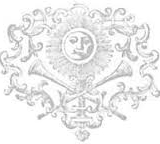 |
Séminaire international: Pensées sur la relation franco-allemande et le futur de l'Europe
Séminaire international The Federalist, Strasbourg
07 mars, 2009
Intervention sur L'Europe face à un monde multipolaire en déséquilibre. Force est de constater que ce chemin ne se dégage pas automatiquement d’une intégration européenne toujours plus poussée. Celle-ci pourrait même conduire, à défaut d’une prise de conscience urgente et générale des enjeux, exactement à l’inverse.
|
 |
L'Europe face à un monde multipolaire en déséquilibre
The Federalist Year LI, 2009
07 mars, 2009
La place de l’Europe est loin d’être assurée sur l’échiquier géopolitique, actuellement en pleine reconfiguration. Pourtant, cela fait déjà un bon moment que les évolutions en cours sont amorcées et que les grandes lignes de ces mutations se dessinent de manière plutôt limpide. Ce que l’on désignait, au lendemain de la disparition de l’Union soviétique, comme « le moment unipolaire » touche inexorablement à sa fin, n’en déplaisent à ceux qui voulaient, et pour certains voudraient encore, y placer tous leurs espoirs. Les Etats-Unis, toujours soucieux de maintenir leur leadership dans les affaires de la planète, ont été longtemps agacés d’entendre parler de « monde multipolaire ». Ils y voyaient l’expression codée d’un complot anti-américain. Auquel agacement les responsables européens, en particulier français, n’avait de cesse de rétorquer qu’il s’agissait non point d’un projet, mais d’un constat tout simple.
|
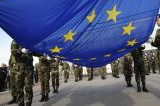 |
Bilan 2008 de la politique de sécurité et de défense de l’Union européenne
Défense & Stratégie n°25, hiver 2008
31 déc, 2008
L’année 2008 fut celle d’un triple anniversaire et d’une double illusion en matière de défense européenne. Il y a quinze ans, l’entrée en vigueur du traité de Maastricht marque le lancement officiel de la PESC (politique étrangère et de sécurité commune), assortie de la perspective d’une éventuelle future composante défense.
|
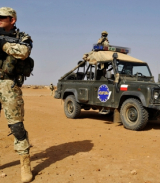 |
Bilan 2007 de la politique de sécurité et de défense de l’Union européenne
Défense & Stratégie n°22, janvier 2008
20 févr, 2008
Le petit tour d’horizon qui suit se propose de résumer les principaux développements de l’année 2007 en matière de Défense européenne. Pour ce faire, deux remarques préliminaires s’imposent. La première est terminologique ; elle concerne la dénomination PESD (politique européenne de sécurité et de défense) utilisée jusqu’à aujourd’hui, y compris dans cet article. Elle deviendra, une fois le nouveau traité ratifié, la PSDC (politique de sécurité et de défense commune). La deuxième remarque consiste à souligner que les développements et les débats au cours de l’année 2007 continuent à graviter autour du concept le plus controversé de la Défense européenne, à savoir le terme « d’autonomie ». |
 |
Lancement du livre Pour une Europe européenne. Une avant-garde pour sortir de l’impasse
Librairie Kléber, Strasbourg
06 nov, 2007
Le 6 novembre à la Librairie Kléber à Strasbourg eut lieu le lancement du livre Pour une Europe européenne. Une avant-garde pour sortir de l’impasse sous l’égide du Forum Carolus."Cet événement a été l’occasion de mener un débat autour de l’impératif d’une relance de la construction européenne par la création d’une avant-garde sur la base d’un « noyau dur » franco-allemand. Cette démarche est fondamentale pour ne pas aboutir à une impasse et relever le défi des alliances stratégiques permettant à l’Europe de renforcer sa souveraineté."
|
 |
Europe européenne ou Europe atlantique : une question de «préférence»…
La Lettre Sentinel n°47, octobre 2007
31 oct, 2007
Ces derniers mois ont vu le retour en force du bon vieux débat « protectionnisme » versus libéralisme. Autrement dit, sur les rôles respectifs du politique et de l’économique, ou encore le face-à-face entre logique de puissance et logique du marché. Avec la question implicite sur la nécessité d’une « préférence européenne », et la mise à nu immédiate des contradictions inhérentes du credo libéral-atlantiste.
|
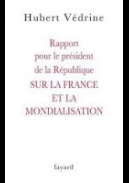 |
La France, l’OTAN et l’Occident – à la marge du rapport Védrine
La Lettre Sentinel n°47, octobre 2007
31 oct, 2007
Dans son Rapport sur la France et la mondialisation, rédigé à la demande du Président de la République, Hubert Védrine aborde la question de l’OTAN à l’intérieur du chapitre consacré à « L’option atlantiste/occidentaliste ». Fort à propos, l’ex-ministre des Affaires étrangères distingue cette dernière de « la politique normale d’amitié et de coopération avec les Etats-Unis », et la décrit comme « une réorientation en profondeur » qui s’inscrit dans le schéma du choc des civilisations : « Menacés, les Occidentaux devraient se serrer les coudes ».
|
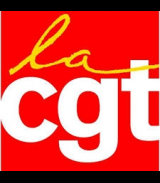 |
Le secteur de l’armement face aux grands défis de la construction européenne
Colloque syndical européen de la FNTE CGT
29 sept, 2007
Comment concilier deux logiques fondamentalement différentes: celle du secteur de l'armement avec tous les impératifs stratégiques qui y sont liés, et celle de la construction européenne qui oscille entre entité quasi politique et grand marché? Intervention au Colloque syndical européen de la FNTE (Fédération Nationale des Travailleurs de l'Etat) de la CGT.
|
 |
L'avant-garde européenne : diagnostic, remède, raison d être
Intervention aux Assises des Associations d'Europe
28 sept, 2007
La réflexion qui suit se propose de partir d’un diagnostic (celui de l’impasse), elle se poursuit en identifiant le remède (projet d’avant-garde), pour se clore par l’évocation de la raison d’être de toute initiative européenne digne de ce nom (sauvegarde de notre liberté de choix).
|
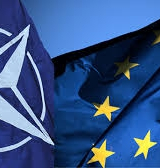 |
Le syndrome UE-OTAN: coup de projecteur sur les réalités transatlantiques
Journal of Contemporary European Research Vol3 I2
21 sept, 2007
Contrairement aux deux courants dominants, quoique diamétralement opposés, des pronostics qui furent très à la mode il y a quelques années, il apparaît de plus en plus clairement que les casse-tête liés à la problématique UE-OTAN sont appelés à durer. Ceux qui, au vu des difficultés initiales à établir des relations mutuellement acceptables entre les deux organisations, parlaient de « maladies de jeunesse » susceptibles de céder la place, avec le temps, à une insertion harmonieuse du nouveau-né « PESD » (politique européenne de sécurité et de défense) dans le système atlantique, ont eu tout aussi tort que ceux qui y voyait encore une nouvelle occasion pour sonner le glas de l’Alliance atlantique. Hélas, pour l’heure et dans un avenir prévisible, aucun des deux scénarios ne semble près de se réaliser.
|
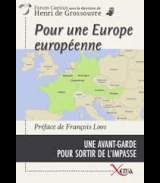 |
Une avant-garde pour préserver et renforcer la souveraineté européenne
Pour une Europe européenne (ed. H. de Grossouvre)
14 sept, 2007
« L’avant-garde européenne n’a de sens et de légitimité que si elle est inspirée par une vision stratégique, visant au renforcement de tous les aspects de la souveraineté européenne. Seul un tel projet pourra contribuer à la préservation d’une ‘certaine idée de l’Europe’ : un acteur géopolitique à part entière capable de garantir notre sécurité, de promouvoir nos valeurs et nos intérêts et de défendre notre modèle économique, social, environnemental et culturel. Pour ce faire, il faut clairement se démarquer des scénarios alternatifs et veiller à ne pas céder aux facilités et aux fausses sirènes.
|
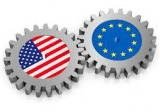 |
Les questions d’armement sous un éclairage transatlantique
Présentation à l’Université d’été du CIFE-IEHEI
04 sept, 2007
Après avoir relevé quelques enjeux liés au secteur de l’armement, un bref rappel historique propose de clarifier le contexte des débats actuels. On abordera ensuite certaines caractéristiques générales de l’industrie de défense américaine d’une part, européenne de l’autre. Finalement, des mythes trompeurs seront décryptés, notamment l’imposture de l’« écart » technologique, la sainte horreur inspirée par la notion d’« Europe forteresse » et l’éloge tendancieux de la « complémentarité ».
|
 |
Convergences et collisions euro-américaines (revue de livre)
La Lettre Sentinel n°46, juin 2007
28 juin, 2007
Un coup de projecteur dans les coulisses de l’activisme (public-privé) américain à l’Union européenne, voilà ce que nous propose Florence Autret dans son dernier ouvrage. Et elle tient sa promesse. L’éclairage qu’elle apporte est impitoyable : non pas tant pour ceux qui agissent pour promouvoir, certes parfois un tantinet trop brutalement, les intérêts particuliers ou collectifs qu’ils représentent, mais pour ceux qui se contentent de subir – au risque de compromettre, pour ne pas dire trahir, les intérêts qu’ils seraient censés, eux, défendre et représenter.
|
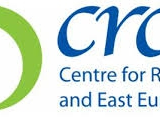 |
L'impact de l'adhésion à l'UE sur la politique étrangère
University of Glasgow CRCEES Research Forum
11 mai, 2007
Forum annuel de recherche CRCEES (Centre for Russian, Central and East European Studies) Intervention sur l'impact de l'adhésion à l'UE sur la politique étrangère des pays d'Europe centrale et orientale.
|
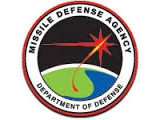 |
Levée de bouclier(s) : interrogations autour du projet américain de défense antimissile
La Lettre Sentinel n°45, mars-avril 2007
06 avril, 2007
Durant la dernière année de l’administration Clinton et les neuf premiers mois de l’équipe Bush au pouvoir, un large consensus s’était dessiné dans les conférences d’experts et les réunions semi-officielles des deux côtés de l’Atlantique : tout le monde fut d’accord pour dire que la NMD (National Missile Defense) allait devenir « le » grand sujet de controverse des mois et années à venir.
|
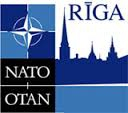 |
Champs de bataille otaniens après le sommet de Riga
La Lettre Sentinel n°43-44, janvier-février 2007
09 févr, 2007
Le sommet de Riga de l’OTAN, fin novembre dernier, fut l’exemple type du non-événement spectaculaire. Frappant surtout par le contraste entre les attentes aiguisées par la publicité faite à la rencontre des 26 chefs d’Etats et de gouvernement d’une part, et le bilan piteux de la réunion de l’autre. Les effets d’annonce prévus pour l’occasion avaient peu à peu laissé la place à la réalité envahissante que constitue la déplorable situation des alliés en Afghanistan. Celle-ci n’étant, par ailleurs, que l’un des (très) nombreux symptômes du malaise grandissant au sein de l’Alliance.
|
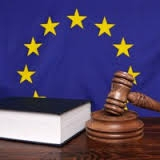 |
Article 296: ami ou ennemi?
EuroFuture Magazine, Winter 2006
01 janv, 2007
Le secteur de l'armement est le champ stratégique par excellence, que ce soit en termes géopolitiques, économiques ou technologiques. Du fait de la coïncidence entre les questions les plus abstraites liées à la souveraineté et la nature la plus tangible des produits (origine, composition, conception), les politiques poursuivies dans ce domaine sont particulièrement indicatives de, et déterminantes pour, la direction que l'Europe est sur le point de prendre.
|
 |
L'autonomie européenne entre rhétorique et réalités
La Lettre Sentinel n°41-42, octobre-novembre 2006
30 nov, 2006
Pour ce qui est du choix systématiquement occulté entre dépendance ou indépendance pour l'Europe, dans les textes, tout semble clair comme de l’eau de roche. Au moment du lancement de la PESD (politique européenne de sécurité et de défense), en juin 1999 à Cologne, la déclaration des Quinze stipule d’emblée l’exigence d’autonomie et de crédibilité des moyens de l’Union. Ce qui s’inscrit parfaitement dans les objectifs déclarés à l’article 11 du Traité sur l’Union européenne, notamment « la sauvegarde des valeurs communes, des intérêts fondamentaux, de l’indépendance et de l’intégrité » de l’UE. Toutefois, non seulement nous sommes toujours en attente pour voir quand ces belles paroles seront-elles traduites dans les actes, mais la question même de savoir si elles devraient l’être un jour reste objet de débat.
|
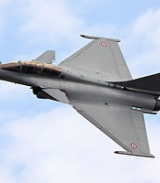 |
L'article 296 du TCE : obstacle ou garde-fou ?
Défense & Stratégie n°18, octobre 2006
31 oct, 2006
Assiégé de toutes parts, l’article 296 (ex-article 223) du traité instituant la Communauté européenne apparaît pour certains comme un anachronisme. En établissant une dérogation générale au droit communautaire dans le domaine de la production et du commerce du matériel militaire, il serait l’incarnation même d’un « protectionnisme » hideux, rétrograde, anti-marché et anti-européen.
|
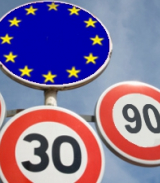 |
Devenir souple pour maintenir l’ensemble: la logique et les pièges du concept d’«intégration différenciée »
The Federalist, XLVIII, 2006, N° 1
28 oct, 2006
Le présent article donne un bref aperçu des aspects terminologiques, historiques, théoriques et politiques des scénarios « d'intégration différenciée ». Il part du fait que si la « flexibilité » est le seul moyen de consolider l'acquis et de poursuivre le projet d'intégration, la différentiation ne mène pas automatiquement à une Europe plus ambitieuse, plus puissante et plus européenne. Afin d’assurer un tel résultat, les pionniers de la flexibilité doivent prêter une attention particulière à deux critères cruciaux.
|
 |
Vers quel « marché commun » en matière d’armement ? (sur le code de conduite volontaire sur les marchés publics d’équipements de défense)
Biztonságpolitikai és Honvédelmi Kutatások Központ
06 oct, 2006
Le dénommé code de conduite, entré en vigueur le 1 juillet 2006 avec la participation de 22 Etats-membres de l’Union et censé encourager « l’européanisation » des marchés publics d’équipements militaires, n’est que le début. Il marque notamment l’entrée en scène, en des termes implacablement concrets, des questions politiques fondamentales (différées depuis plus d’un demi-siècle) de la construction européenne. En tant que début, il est par nature imparfait et ambigu. Mais reflète à merveille les possibilités et les limites de la volonté politique qui est à son origine.
|
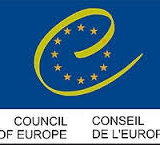 |
Les outils de l’indépendance de l’Europe
Colloque à Strasbourg, au Conseil de l'Europe
05 oct, 2006
Pour ce qui est du choix systématiquement occulté entre dépendance ou indépendance européennes, dans les textes, tout semble clair comme de l’eau de roche. Au moment du lancement de la PESD (politique européenne de sécurité et de défense), en juin 1999 à Cologne, la déclaration des Quinze stipule d’emblée l’exigence d’autonomie et de crédibilité des moyens de l’Union. Ce qui s’inscrit parfaitement dans les objectifs déclarés à l’article 11 du Traité sur l’Union européenne, notamment « la sauvegarde des valeurs communes, des intérêts fondamentaux, de l’indépendance et de l’intégrité » de l’UE. Toutefois, non seulement nous sommes toujours en attente pour voir quand ces belles paroles seront-elles traduites dans les actes, mais la question même de savoir si elles devraient l’être un jour reste objet de débat.
|
 |
Prospective sur la défense européenne
Biztonságpolitikai és Honvédelmi Kutatások Központ
06 aout, 2006
Il convient d’abord de souligner que ni les élections françaises de 2007, ni celles aux Etats-Unis en 2008 n’altèreront de manière notable – c’est-à-dire outre les gestes et effets d’annonce programmés pour ces occasions – les orientations traditionnelles de la politique étrangère et de sécurité des pays en question. De même, les péripéties du nouveau traité européen, le rythme effectif de la fuite en avant de l’UE par l’élargissement, et les multiples initiatives transatlantiques basées sur des changements d’emballage à Washington sont parfaitement secondaires du point de vue de l’évolution réelle de la construction européenne et de nos relations avec les Etats-Unis.
|
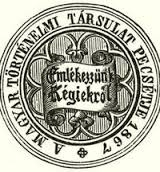 |
L'UE aujourd’hui - diagnostic et scénarios
Európai Unióról és oktatásáról (ed. O. Szabolcs)
13 mai, 2006
Le processus d’intégration européenne est, sans l’ombre d’un doute, l’innovation politique la plus significative du dernier demi-siècle. Parti d’un sentiment de nécessité, il fut guidé par l’espoir que la construction d’une communauté entre pays européens montrera un jour le chemin vers l’organisation du monde du demain. Toutefois, notre sujet ici n’est pas de disserter sur le caractère à la fois brillant, nécessaire et prometteur du projet. Car la crédibilité et la légitimité intérieures et extérieures du processus européen sont aujourd’hui fortement entamées par le gouffre énorme entre la rhétorique médiatico-officielle et la réalité.
|
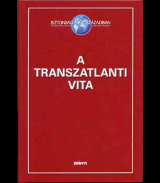 |
Vers la démystification de la relation transatlantique
A transzatlanti vita (ed. H. Vincze)
04 mai, 2006
Les relations euro-américaines sont périodiquement ennuagées par les « malentendus » dits ponctuels, les escarmouches verbales prétendument imprévues, les tempêtes diplomatiques qui semblent se lever d’un jour à l’autre, et d’autres manifestations de la suspicion mutuelle. Leur perception est dramatisée de façon exponentielle par le fait qu’elles surgissent de sous le couvercle d’une prétendue communauté de valeurs et d’intérêts, dans une relation supposément impeccable. Ce contraste, qui peut paraître inexplicable, augmente le risque de la montée en puissance d’une réaction viscérale (issue justement de l’incompréhension) des deux côtés de l’Atlantique : l’anti-américanisme ici, sentiment d’hostilité vis-à-vis de l’Europe là-bas.
|
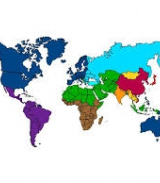 |
La relation « Islam-Occident » : deux mondes ?
Globális biztonsági kihívások (ed. Tarrósy I.-Glied V.)
25 avril, 2006
Lorsque l’on examine les rapports entre civilisations, il faut avant tout clairement distinguer les acteurs étatiques pourvus du droit et de la capacité à l’action politique, et les sphères culturelles d’envergure et de cohésion variables, lesquelles ne le sont pas. Comme l’avait observé l’excellent analyste américain, William Pfaff : « Aucune de ces civilisations, assez arbitrairement définies, n’est ou n’a été, en tant que telle, une entité ou un acteur politique. Les nations agissent. Les gouvernements font des guerres. Mais les civilisations ne sont pas des unités politiques et aucun indice ne prouve qu’elles le deviendront. » Ceci ne signifie nullement, on le verra par la suite, une quelconque sous-estimation des facteurs culturels et identitaires.
|
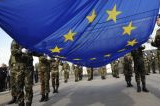 |
Petit aperçu sur la politique étrangère, de sécurité et de défense de l’Union européenne
Etudes et analyses, 08 avril, 2006
D’après la fameuse phrase prononcée au début des années 1990 par le ministre luxembourgeois des Affaires étrangères, Jacques Poos, l’UE est « un géant économique, un nain politique et un ver militaire ». Si cette définition est loin d’être tout à fait fausse, elle n’en a pas moins besoin d’une mise à jour et, surtout, d’une bonne dose de clarification.
|
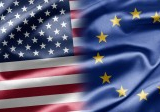 |
Les relations transatlantiques à la lumière des industries d’armement
Lecture at Jozsef Antall Foundation, Corvinus University
05 avril, 2006
Les limites du présent cadre ne permettent que d’esquisser une vue d’ensemble forcément approximative des processus politiques et des enjeux stratégiques qui se trouvent derrière les dossiers d’armement. La ligne directrice en est simple : dans le domaine des industries et des technologies d’armement, il s’agit des bases matérielles de la souveraineté, autrement dit des piliers concrets de la capacité autonome de décision et d’action. Chacune des mesures en matière de recherche, de développement, de production et d’acquisition est une décision politique au sens le plus strict du terme. C’est en cette qualité qu’elle doit être appréhendée et transférée du cercle restreint des spécialistes vers la place publique. Car les décisions politiques méritent débat politique.
|
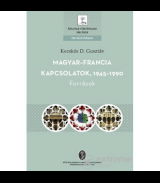 |
A la charnière de deux époques
Magyar-francia kapcsolatok 1945-1990 (G. Kecskés)
20 mars, 2006
Commentaire de document au sujet de la visite à Budapest du président de la Commission européenne, Jacques Delors et du ministre français des Affaires étrangères, Roland Dumas, les 16-17 novembre 1989
|
 |
Hystérie de masse et Realpolitik autour de Mahomet
interview ma.hu
09 févr, 2006
"L’Europe paye le prix fort de sa couardise habituelle et, encore une fois, la plupart de ses politiciens ne songent qu’à baisser les bras. Or, à la longue, ce n’est que de l’huile sur le feu." D’autant que "l’agitation d’aujourd’hui est avant tout un épisode dans un bras de fer infiniment plus large."
|
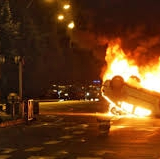 |
L'Europe : chronique d’un déclin annoncé (démographie, immigration, intégration)
Népszabadság Online
23 janv, 2006
C’est toujours un spectacle édifiant de voir les dirigeants européens - maîtres dans l’art du démenti, du camouflage et de la mise sous tapis des dossiers délicats - lorsqu’ils se retrouvent le dos au mur. Tel était le cas lors des émeutes en France, notamment face aux avertissements plutôt vigoureux traduisant les tensions internes des sociétés européennes.
|
 |
Histoire de satellites entre les deux rives de l'Atlantique 1 (Galileo vs GPS)
Népszabadság Online
10 janv, 2006
Galileo (le système européen de navigation par satellite qui se prépare dorénavant aussi dans l’espace, suite au lancement du premier satellite de démonstration) est l’un des projets stratégiques décisifs de la décennie. Dans tous les sens, y compris militaire, du terme. Il préfère, bien sûr, se faire discret à cet égard. Qui plus est, si d’autres en font la remarque, il dément avec véhémence.
|
 |
Etat des lieux de la défense européenne
Az EU biztonság és védelempolitikai dokumentumai 3
19 déc, 2005
Le présent papier au sujet de la politique de sécurité et de défense de l’Union européenne (PESD) fait un bref tour d’horizon sur 1. Les développements de l’an 2005 ; 2. Opinion publique et contrôle démocratique ; 3. Industries et technologies d’armement ; 4. Gestion civile des crises ; 5. Coopération avec l’ONU.
|
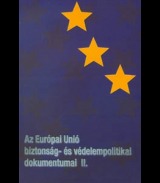 |
Les perspectives d'une culture stratégique européenne commune
Az EU biztonság- és védelempolitikai dokumentumai 3 (ed. J. Takács - P. Tálas - H. Vincze)
01 déc, 2005
La présente étude commence par examiner le concept de « culture stratégique », avant de tenter de dresser l’inventaire des nombreuses lignes de fracture divisant les Etats membres de l’UE dans ce domaine. Pour conclure, elle se focalise sur les forces qui permettent ou empêchent de surmonter ces divergences. En soulignant tout au long que la véritable question ne concerne pas la faisabilité d’une éventuelle synthèse, mais plutôt sa substance. Autrement dit, il s’agit de savoir si une culture commune européenne en matière de sécurité pourra-t-elle jamais avoir un contenu réellement stratégique.
|
 |
L'idée d'avant-garde replacée dans son contexte
intervention Réunion du Forum Carolus, Strasbourg
25 nov, 2005
L’Europe d’aujourd’hui se caractérise par un flou stratégique et identitaire : elle est sans contours géographiques et politiques. Ses frontières géographiques restent toujours imprécises aussi bien vers l’Est et le Sud, que dans la direction de l’Ouest. La souveraineté européenne se retrouve, elle, dans une sorte de zone grise : les Etats-membres abdiquent des pans entiers de leur souveraineté nationale sans qu’il y ait au niveau européen une entité politique prête et capable de défendre la capacité de décision et d’action autonome des Européens.
|
 |
L'Europe en cercles multiples: variations sur le thème de l intégration «flexible»
Külügyi Szemle 2005/3-4
15 nov, 2005
La présente analyse étudie l’un des points cruciaux des débats sur l’évolution de l’Union européenne, à savoir la problématique de la « différenciation ». En soulignant au sujet de cette méthode d’intégration connue sous les noms de « Europe à plusieurs vitesses », « noyau dur » ou « Union à géométrie variable » qu’elle n’est en soi ni positive, ni négative. La question de savoir si la montée en puissance de la différenciation mènera à la désintégration ou à la redynamisation de l’intégration dépend in fine de deux choses : au service de quelle politique et suivant quelles modalités les mesures visant à la flexibilité seront-elles mises en œuvre.
|
 |
Modèle européen de sécurité
Népszabadság Online
25 oct, 2005
Lâche, impuissant, mollasson, tigre en papier. Voici quelques-uns des adjectifs employés outre-Atlantique pour décrire l’attitude européenne en matière de sécurité. A la limite c’est même compréhensible, si l’on regarde à partir de la spirale auto-alimentée du budget militaire américain (lequel s’élève à près de la moitié des dépenses militaires du monde entier) ou depuis les innombrables gadgets spatiaux dont le degré de fiabilité sur le plan du renseignement est de notoriété publique depuis le conflit en Irak. Mais vu les pieds sur terre, le tableau change quelque peu.
|
 |
L'Union et le peuple
Népszabadság Online
19 oct, 2005
« On ne tombe pas amoureux d’un grand marché » - disait Jacques Delors, ancien président de la Commission européenne. En effet, c’est la leçon la plus importante que les dirigeants de l’Union devraient tirer du désaveu populaire croissant. Car, manifestement, les citoyens voudraient plus que cette Europe mutilée à l'anglo-saxonne
|
 |
L'avant-garde comme nécessité et opportunité
Les Débats du Forum Carolus
13 oct, 2005
"L’Europe intégrée où il n’y aurait pas de politique, se mettrait alors à dépendre de quelqu’un du dehors qui, lui, en aurait une." (Charles de Gaulle, 1961). Il y a une seule question qui vaille dans l’état actuel de l’Union européenne. C’est de savoir si cette crise est enfin « la » crise. La réponse dépend uniquement de la volonté politique des dirigeants des Etats membres, au premier chef desquels la France et l’Allemagne.
|
 |
Berlin-Paris-Washington: réflexions à la veille des élections en Allemagne
Notes d’actualité, 17 sept, 2005
Il est impressionnant de voir à chaque élection la plupart des commentaires prêts à tomber et à retomber dans le même piège. Prenant la rhétorique pour argent comptant et faisant fi des réalités géopolitiques, ils nous racontent – les uns avec enthousiasme, d’autres avec appréhension – à quel point la politique étrangère du pays en question est susceptible d’un changement fondamental. Pourtant, c’est loin d’être aussi simple.
|
 |
Les relations UE-OTAN: entre coopération nécessaire, compétition inhérente et l’inéluctable changement de paradigme
Az Észak-atlanti Szerződés Szervezete a változás korában
15 aout, 2005
Les relations UE-OTAN ne sont qu’un symptôme. Elles reflètent d’un côté l’épreuve de force entre les deux rives de l’Atlantique et, de l’autre, la schizophrénie intra-européenne. Au centre de ce bras de fer complexe, il y a une seule question cruciale et un seul véritable enjeu : l’autonomie européenne. Pour ce qui est du prétendu choix à faire entre coopération ou compétition UE-OTAN, c’est un faux dilemme. Dans l’état actuel des rapports de force, les deux sont inévitables.
|
 |
Explosions en perspective
Népszabadság Online
08 juil, 2005
Au lendemain des « incidents » terroristes à Londres, il est important de noter que ce qui s’est passé n’est pas une surprise, pas un échec, pas un réveil européen et pas le début d’une nouvelle ère. La principale caractéristique de la série d’attentats qui s’est produite hier dans la capitale britannique, est qu’elle n’a absolument rien changé ni à la menace terroriste, ni à la lutte contre celle-ci. Les rhétoriques politiciennes ou journalistiques qui prétendent le contraire sont simplement à la recherche de prétextes.
|
 |
Le grand écart des Britanniques au-dessus de l'Atlantique
Népszabadság Online
05 juil, 2005
L’adhésion de l’Angleterre à la Communauté européenne marquerait le début d’une dilution au bout de laquelle « il apparaîtrait une Communauté atlantique colossale sous dépendance et direction américaines et qui aurait tôt fait d’absorber la communauté de l’Europe. » Les mots prophétiques du général De Gaulle, en 1963, ne cessent de se vérifier depuis.
|
 |
L'UE, la crise, la solution et nous
Népszabadság Online
20 juin, 2005
L’élargissement de l’Union européenne en 2004 était une erreur. On le savait depuis que les anciens Etats-membres se révélaient incapables de saisir l’occasion qui se présentait avec le projet de confédération européenne de François Mitterrand, et n’avaient pas la volonté politique pour mettre en route aucune autre forme de différenciation sur la base d'ambitions politiques durant la décennie qui a suivi.
|
 |
La souffrance de l'Union et le remède
Népszabadság Online
04 juin, 2005
Il y a une seule question qui vaille dans tout ce chaos autour du traité constitutionnel. C’est de savoir si cette crise est enfin « la » crise. La réponse dépend uniquement de la volonté politique des dirigeants des Etats membres, au premier chef desquels la France et l’Allemagne. La souffrance est le résultat non pas du, mais des élargissements. Les chefs d’Etat et de gouvernement des Six, en 1969 à la Haye, avaient beau dire ne pas marquer leur accord pour l’ouverture des négociations d’adhésion que « pour autant que les Etats candidats acceptent les traités et leurs finalité politiques ».
|
 |
La conscience française de l'Europe
Népszabadság Online
27 mai, 2005
D’après Madelaine Albright, ex-Secrétaire d’Etat américain: « Pour comprendre l’Union européenne on doit être un génie – ou français ». En effet, la France constitue la clef-de-voûte de tout le projet européen. Un état de fait que, paradoxalement, les débats houleux autour du traité dit constitutionnel ne font que renforcer.
|
 |
Les survivants de Mars
ma.hu
09 mai, 2005
Les thèses sur (la prétendue) impuissance de l’Europe et sur la (supposément) bienveillante omnipotence (autoproclamée) des Etats-Unis témoignent d'une profonde ignorance.
|
 |
Histoire d'avions entre les deux rives de l'Atlantique 2 (Airbus vs. Boeing)
Népszabadság Online
30 avril, 2005
« Pourquoi le gouvernement américain soutient-il et subventionne-t-il l’industrie aéronautique américaine à travers des contrats de la défense ? Simplement parce que l’avenir des USA, et celui de l'Europe dans notre cas, ne réside pas dans les parfums ou les pop-corns. L’avenir, c’est l'électronique, l’informatique, l'avion, les missiles et l'espace. » - la remarque a été faite par Jean Pierson, ex-président d'Airbus Industrie, en 1987.
|
 |
Histoire d'avions entre les deux rives de l'Atlantique 1 (Joint Strike Fighter/F35)
Népszabadság Online
08 avril, 2005
L’histoire mouvementée de l’avion militaire Joint Strike Fighter (F35) est une véritable petite fable édifiante. Elle nous permet de contempler d’un côté les mécanismes de fonctionnement parfois presque pervers de la politique étrangère et de défense des Etats-Unis et, de l’autre, le processus d’abandon volontaire des positions et des atouts européens. Bref, il s’agit d’un condensé éminemment instructif de l’ensemble des relations transatlantiques.
|
 |
Le casse-tête onusien
Népszabadság Online
24 mars, 2005
Si l’année 2005 est celle de l’ONU, ce n’est pas tant en raison des festivités autour de son 60ème anniversaire, mais à cause plutôt du rapport d’un Groupe de personnalités, déposé en décembre dernier sur la demande du Secrétaire général, intitulé « Un monde plus sûr ». En effet, le sort qui sera réservé au contenu de ce document d’une centaine de pages va envoyer un message fort, que ce soit positif ou négatif, sur l'avenir de l'organisation.
|
 |
Le modèle européen de sécurité face aux nouveaux défis
Security under Global Pressure (ed. I. Tarróssy)
01 mars, 2005
L'article définit d'abord les critères principaux de ce que l'on peut appeler "modèle européen de sécurité", pour examiner ensuite le rôle et la pertinence de ce dernier dans la lutte contre le terrorisme.
|
 |
Faux miroir américain (propagande, Etats-Unis, Europe)
Népszabadság Online
02 janv, 2005
Ce n’est pas les Etats-Unis qui se comportent de façon inexplicable, mais nous les Européens. Washington agit de manière tout à fait prévisible, en fonction de sa position. Cela ne le rend pas moins dangeureux ni pour soi-même, ni pour autrui, de même que ne réduit pas le décalage énorme entre ses intentions affichées et ses aspirations véritables. Mais au fond, son comportement est éminemment logique.
|
 |
Batailles euro-américaines dans l'espace
Népszabadság Online
30 nov, 2004
Ce n’est pas dans « une galaxie lointaine, très lointaine », mais néanmoins au-delà de l’atmosphère terrestre que se déroule l’une des manches les plus passionnantes du match transatlantique. Bien qu’il ne s’agisse pas d’une véritable compétition. Car si pour les Etats-Unis l’enjeu est de s’arroger un contrôle absolu des activités spatiales, l’Europe, elle, ne peut aspirer qu’à essayer d’éviter la dépendance totale.
|
 |
Les nouveautés du traité constitutionnel en matière de politique de sécurité et de défense
Eszmélet n°64. November 2004
01 nov, 2004
La politique de sécurité et de défense est le domaine où le nouveau traité de l’Union, baptisé « Constitution », contient le plus d’infléchissements positifs. Ces nouveautés sont cruciales quel que soit le sort immédiat de la "Constitution": ils démontrent le point d'équilibre délicat entre l'exigence minimale pour un fonctionnement efficace et le degré maximum de volonté politique au niveau des Vingt-Cinq.
|
 |
L'adhésion de la Turquie à l'UE: beaucoup de bruit pour rien
Népszabadság Online
06 oct, 2004
Le rapport mitigé de la Commission sur l’adhésion de la Turquie marquait la fin d’une double imposture. Celle à l’adresse de la Turquie avec le mirage d’un statut d’Etat-membre à part entière (manifestement déjà en tant que candidate elle n’a pas les mêmes droits que les autres). Et celle destinée à l’opinion publique européenne prétendant que les élargissements successifs n’altèrent pas fondamentalement la nature de l’Union. Car c’est précisément ce qu’ils font.
|
 |
Perspectives et limites de l’Union européenne dans la lutte contre le terrorisme
Európai Szemle, 2004/2
01 aout, 2004
Par pure coïncidence, c’est à Madrid, en décembre 1995 que le sommet de l’UE eut lieu où les chefs d’Etat et de gouvernement des Quinze ont affirmé, pour la première fois, au sujet du terrorisme tout ce qu’ils ne pouvaient que répéter huit ans après – à la suite des attentats du 11 mars 2004.
|
 |
La Hongrie et l Union: besoin d engagement maximal
Archives, 14 juin, 2004
Ce serait déjà une grande aide si notre élite politique parlait enfin de l’essentiel (à savoir aux rares occasions où ils ont l’amabilité de formuler une réflexion quelconque au sujet de l’Europe). Si l’on entendait autre chose de leur part que les considérations purement financières ou le discours plutôt vague sur « les valeurs communes ». Puisque dans l’UE il s’agit avant tout de souveraineté (et de son partage), de législation et de prise de décision – c’est-à-dire de la politique par excellence. Et si la construction européenne se trouve toujours au stade ambigu que Jacques Delors caractérisait comme « objet politique non identifié », cet objet reste néanmoins essentiellement politique. C’est de cette manière qu’il doit être appréhendé, que les avantages et inconvénients qui en découlent doivent être mesurés, et que l’on doit s’engager pour ou contre son approfondissement. Pour obtenir le texte intégral en français, veuillez contacter l’auteur.
|
 |
L'Europe face au nouveau type de terrorisme
Journal Francophone de Budapest
30 avril, 2004
Avec les attentats de Madrid, le « nouveau type de terrorisme » fit irruption d’une manière tragiquement spectaculaire sur le sol européen. Il n’en reste pas moins que ce carnage était tout sauf inattendu.
|
 |
Le triangle Paris-Berlin-Londres: une tentative de quadrature du cercle
Journal Francophone de Budapest
03 avril, 2004
Lorsque les dirigeants français, allemand et britannique se sont retrouvés à Berlin pour leur troisième sommet tripartite en moins de six mois, de nombreux partenaires ont exprimé la crainte de l’institutionnalisation d’une sorte de triumvirat.
|
 |
Chevaux de Troie ? : la nouvelle Europe à l’entrée de l’Union
Journal Francophone de Budapest
18 févr, 2004
Participant à un forum sur la sécurité transatlantique à Munich, le 3 février dernier, le secrétaire américain à la Défense, Donald Rumsfeld, persiste et signe. Il déclare toujours « ne pas regretter » sa remarque scandaleuse de janvier 2003 sur l’opposition entre une « vieille Europe » traîtresse mais sans importance (à savoir la France et l’Allemagne opposées à la guerre en Irak) et la « nouvelle Europe » fidèle et pleine de promesses (il s’agit des pays d’Europe centrale et orientale dont les gouvernements ont fait allégeance à l’Amérique belliciste).
|
 |
La défense européenne au centre des débats
Journal Francophone de Budapest
03 déc, 2003
Quelques mois après le paroxysme de la crise irakienne (du moins en ce qui concerne les affrontements transatlantiques et intra-européens qu’elle avait engendrés), en pleine phase finale de la Conférence intergouvernementale (CIG) censée décider de la Constitution européenne, et à la veille de l’adhésion des dix nouveaux membres à l’Union, le dossier de la défense européenne semble avoir atteint son heure de vérité.
|
 |
Visions et contre-visions, ou sur les contradictions fondamentales des relations transatlantiques
Külügyi Szemle 2003/4
01 déc, 2003
La crise irakienne n’a fait que révéler au grand jour les tensions structurelles des relations euro-américaines, couvées depuis des décennies et devenues plus épineuses après la fin de la période bipolaire. Outre la pseudo-vision officielle et les visions d’occasion représentées par les inconséquences allemandes, les deux grandes visions, concurrentes l’une de l’autre, sur l’Europe, les relations transatlantiques et l’ordre international sont défendues par la Grande-Bretagne et la France.
|
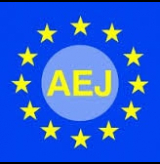 |
The renaissance of Europe
International Congress of European Journalists
15 nov, 2003
International Congress of the Association of European Journalists, on The renaissance of Europe and the Media. Panel discussion and presentation on the European idea and sovereignty.
|
 |
Beaucoup de bruit autour de la pseudo-Constitution européenne
Journal Francophone de Budapest
15 oct, 2003
Tous les commentateurs avisés, qu’ils soient déçus ou soulagés, s’accordent pour dire que le texte qui fera l’objet d’âpres négociations lors de la Conférence intergouvernementale (CIG) lancée le 4 octobre dernier, n’a de Constitution que le nom. Et encore.
|
 |
La présidence italienne de l UE (2) : scénarios et dramaturgie
Journal Francophone de Budapest
03 sept, 2003
« Ne vous inquiétez pas, six mois sont vite passés », c’est en ces termes que Silvio Berlusconi a voulu calmer les députés européens indignés par ses propos et son comportement dès le tout début du semestre de présidence italienne.
|
 |
La présidence italienne de l UE (1) : acteurs et mise en scène
Journal Francophone de Budapest
13 aout, 2003
L’Italie berlusconienne a pris les rênes de l’Union européenne dans un climat d’attente inquiète, où contrastaient un sentiment général exprimé par l’hebdomadaire britannique « The Economist » qui jugeait le président du Conseil italien « inapte à diriger l’Europe » et les déclarations confiantes de celui qui se dit « condamné à toujours gagner ».
|
 |
La défense européenne entre en action
Journal Francophone de Budapest
09 juil, 2003
Dans la foulée de la guerre en Irak, des débats autour de la future Constitution européenne et des préparatifs pour l’adhésion de dix nouveaux pays à l’UE, les premiers pas concrets de l’Europe de la défense sont passés presque inaperçus.
|
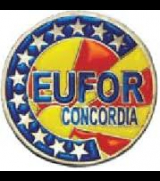 |
Au-delà du symbolisme : la première opération militaire de l'UE vue dans son contexte
Die Deutsche Gesellschaft für Auswärtige Politik
01 juil, 2003
A casual observer of Concordia – code-name for the European Union’s first-ever military operation, conducted in Macedonia – would be first impressed by the abundance of symbols in almost every aspect of the mission. Not only do the politicians’ declarations put the emphasis on the „symbolic European message” carried by the operation[1] or present it as a „significant step forward in the long process of European integration”[2], but also the EU seems determined to plant its blue flag all over the place in order to increase its visibility – a goal explicitly identified as one of the key objectives of the mission.[3]
|
 |
La Grande-Bretagne et l’Euro(pe) : la non-décision
Journal Francophone de Budapest
18 juin, 2003
Fidèle aux plus profondes traditions de la politique britanniques en matière européenne, l’annonce de Gordon Brown, ministre des Finances, sur l’ajournement de la décision sur l’euro se définit, une fois de plus, par le tryptique « Oui. Non. Peut-être. ».
|
 |
L’Europe face au regain du terrorisme international
Journal Francophone de Budapest
28 mai, 2003
La série d’attentats terroristes du milieu du mois de mai semble réactualiser un avertissement lancé il y a un an par le directeur d’Europol et jugé trop alarmiste à l’époque. En juin 2002, Storbeck expliquait que « La plupart des experts ne se demandent pas s'il y aura un attentat, mais quand il aura lieu et par qui il sera perpétré. C'est une menace pour l'Union européenne, pour ses institutions et ses citoyens ».
|
 |
Le retour aux fondements serait-il un iconoclasme ?
Journal Francophone de Budapest
14 mai, 2003
A l’occasion de l’anniversaire de la déclaration Schuman, il est difficile de ne pas s’interroger sur la portée et la pertinence du discours du salon de l’Horloge par rapport à l’état actuel de la construction européenne.
|
 |
La grande Europe officialisée à Athènes
Journal Francophone de Budapest
23 avril, 2003
Si le Conseil européen d’Athènes n’a rien apporté de fondamentalement nouveau (vu que la décision d’admettre dix nouveaux pays avait été prise à Copenhague et que leur entrée dans l’Union ne deviendra effective que le 1er mai 2004), le choix du site, de même que la présence collective et la prestation solennelle des protagonistes ont incontestablement donné de l’allure à la cérémonie.
|
 |
La guerre en Irak: vers une nouvelle logique pour la défense européenne?
Journal Francophone de Budapest
02 avril, 2003
Le constat des divisions parmi les Etats membres de l’UE au sujet de l’intervention américaine en Irak se conjugue avec la perspective d’un élargissement imminente à 10 nouveaux pays pour renforcer la prise de conscience sur l’impossibilité d’avancer ensemble dans les domaines ultrasensibles comme celui de la politique étrangère et de défense.
|
 |
La remontrance de Chirac : aurait-il vraiment mieux fait de se taire ?
Journal Francophone de Budapest
05 mars, 2003
S’indignant des réprimandes adressées par le président français aux pays candidats – lesquels s’étaient alignés selon lui « trop rapidement » et d’une manière « irresponsable » sur la position américaine au sujet de l’Irak – la plupart des réactions internationales se délectaient à remarquer que c’est plutôt l’auteur de la fameuse phrase qui aurait « manqué une bonne occasion de se taire ».
|
 |
Sans tambours ni trompettes – le très controversé traité de Nice entre en vigueur
Journal Francophone de Budapest
19 févr, 2003
Si l’on en juge par le rythme de plus en plus soutenu auquel les traités européens se succèdent les uns aux autres, on croirait que la perspective de l’élargissement a bien fini par susciter cette prise de conscience que réclamaient ceux qui voulaient consolider la maison européenne avant qu’elle n’accueille d’autres habitants. Par contre, si l’on observe les résultats pour le moins mitigés du traité de Nice – lequel, étant entré en vigueur le 1er février dernier, est le dernier en date –, on n’arrive pas forcément à la même conclusion.
|
 |
Le vieux couple franco-allemand réinventera-t-il la nouvelle Europe ?
Journal Francophone de Budapest
05 févr, 2003
A la lumière d’une remarque acerbe du secrétaire d’Etat américain à la Défense sur la France et l’Allemagne, il convient de revenir sur l’état actuel et les projets d’avenir du couple franco-allemand qui vient de fêter le 40ème anniversaire du Traité de l’Elysée.[1]
|
 |
L'Europe face à la crise irakienne
Journal Francophone de Budapest
22 janv, 2003
En attendant la remise du rapport des inspecteurs de l’ONU en Irak (prévue pour le 27 janvier prochain), un bref aperçu sur l’approche européenne au sujet de la guerre annoncée pourrait mettre en évidence ce qui fait la spécificité de l’UE sur ce dossier d’actualité.
|
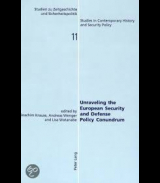 |
Un rôle militaire plus affirmé pour l’UE dans les Balkans ?
Unraveling the European Security and Defense Policy Conundrum (ed. J. Krause - A. Wenger - L. Watanabe)
01 janv, 2003
Après avoir donné un bref aperçu de la gamme d’instruments non militaires mis en œuvre par l’UE dans les Balkans, l’accent est mis sur le fait que l’absence d’une composante militaire crédible risque d’affaiblir – sinon saper – l’ensemble des autres aspects.
|
 |
Un sommet européen pas comme les autres
Journal Francophone de Budapest
18 déc, 2002
Une fois n’est pas coutume, l’usage – si souvent abusif – du terme « historique » est pleinement et même doublement justifié au sujet du sommet de Copenhague.
|
 |
Au miroir de la Turquie, l'Europe s interroge sur elle-même
Journal Francophone de Budapest
28 nov, 2002
Avec ses quelques phrases exprimant son profond désaccord et ses craintes au sujet de l’adhésion, à terme, de la Turquie à l’Union européenne, Valéry Giscard d’Estaing (président de la Convention chargée de débattre les questions liées à l’avenir de la construction européenne) a jeté non pas un pavé, mais un énorme rocher dans la mare.
|
 |
Retour dans l'arène : l'Allemagne post-électorale et l'Europe
Journal Francophone de Budapest
01 nov, 2002
La reconduction au pouvoir de la coalition de gauche « SPD-Verts » en Allemagne est considérée par beaucoup comme le signal fort d’une inversion de tendance après les succès en chaîne des droites européennes en Espagne, en Autriche, en Italie, au Danemark, au Portugal, au Pays-Bas et en France. Néanmoins, cet impact sur la configuration politique de l’UE mis à part, la victoire – très courte – de l’équipe du chancelier Schröder ne semble pas susciter de réflexions particulières au sujet de la politique européenne de l’ancien nouveau gouvernement allemand.
|
 |
L opinion publique de l'UE et l'élargissement : bombe à retardement
Journal Francophone de Budapest
15 oct, 2002
Paradoxalement, c’est à la suite de l’échec du premier référendum irlandais, en juin 2001, sur la ratification du traité de Nice – rejeté par la population principalement par crainte d’être obligés d’abandonner leur neutralité traditionnelle – que les autorités et les médias européennes se sont pour la première fois sérieusement posé des questions sur l’attitude de l’opinion publique face à l’élargissement qui se prépare.
|
 |
La question irakienne, révélatrice des faiblesses de l'Europe politique
Journal Francophone de Budapest
15 sept, 2002
A quelques mois de la décision historique sur l’adhésion des nouveaux membres, l’actualité internationale, dominée par l’éventualité d’une attaque américaine contre l’Irak, pousse à s’interroger – dans la perspective d’une UE à 25 – sur le dilemme « Europe-espace contre Europe-puissance ».
|
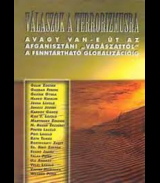 |
La réponse de l'Union européenne aux événements du 11 septembre
Válaszok a terrorizmusra (ed. P. Tálas)
11 sept, 2002
Les spécificités de la situation et de la réaction de l’UE Réponses par domaine d’activité Justice et affaires intérieures Diplomatie, politique étrangère, de sécurité et de défense Assistance humanitaire La sécurité du trafic aérien Mesures dans le domaine économique et financier Protection civile Tendances à long terme Défense collective Flexibilité institutionnelle Fusion inter-piliers Elargissement et approfondissement Dimension méditerranéenne Globalisation durable
|
 |
Débats houleux en perspective autour de la politique agricole commune
Journal francophone de Budapest
25 juil, 2002
En présentant, le 10 juillet dernier, sa révision à mi-parcours de la PAC, la Commission a provoqué des réactions extrêmes, allant des accusations de vouloir détruire les campagnes européennes aux éloges enthousiastes sur l’opportunité et la pertinence des réformes proposées. Car au lieu d’un simple toilettage technique, tel que c’était prévu dans l’Agenda 2000, il s’agirait là d’une véritable réforme en profondeur de la politique la plus emblématique et la plus coûteuse (elle consomme près de la moitié du budget total) de l’Union européenne. Vu l’enjeu à la fois identitaire et financier du débat, des scénarii catastrophes – parmi lesquels le report temporaire de l’élargissement fait pâle figure face aux hypothèses sur la rupture définitive de l’axe franco-allemand, ouvrant la voie à une crise communautaire générale dont l’euro serait la première victime – ont été évoqués pour illustrer les risques encourus au cas où les Etats membres ne parviendraient pas à un accord.
|
 |
La présidence danoise de l’UE et l’élargissement : l’heure de la vérité
Journal francophone de Budapest
03 juil, 2002
Calendrier oblige, l’élargissement sera la priorité absolue de la présidence danoise de l’Union européenne de cette deuxième moitié de 2002. Malgré le nombre important des autres dossiers à traiter (dans les domaines de la sécurité et justice, du développement durable, de la sécurité alimentaire et des relations extérieures) l’attention de la présidence se focalisera sur l’objectif primordial de clôturer les négociations avec les pays candidats qui seront jugés prêts d’ici la fin de l’année. Le parcours jusqu’en décembre est semé d’embûches, mais la détermination du Danemark d’arriver au bout de sa tâche ne fait pas de doute. D’autant que l’élargissement est véritablement la seule ambition européenne de ce petit royaume nordique (de 5,3 millions d’habitants), connu pour sa réticence face à toute nouvelle initiative politique de l’UE.
|
 |
Négociations d’adhésion : le très épineux dossier agricole
Journal francophone de Budapest
25 mai, 2002
A partir de mi-avril, la convergence de plusieurs développements touchant de près l’avenir de l’agriculture européenne a propulsé au premier plan de l’actualité le dossier agricole, annoncé depuis longtemps comme l’une des éventuelles pierres d’achoppement des négociations d’adhésion.
|
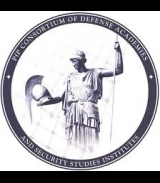 |
NATO Partnership for Peace European Security ESDI-CESDP Study Group (ESSG) meeting
NATO PfP Study Group meeting, Bern, Switzerland
21 avril, 2002
The European Security ESDI-CESDP Study Group (ESSG) has held his second 2002 meeting in Bern, Switzerland on April 21-23, 2002, as scheduled, on the invitation of the Swiss Department of Foreign Affairs. The meeting focused on "The Impact of the "Global War On Terrorism" ("GWOT") on European Security"
|
 |
En marge d un anniversaire… (dix ans après la dissolution du Pacte de Varsovie)
Journal Francophone de Budapest
01 juil, 2001
Lorsque le 1er juillet 1991, les pays membres du Pacte de Varsovie - à la fois symbole et instrument concret de l'emprise soviétique sur l'Europe centrale et orientale - signent la dissolution officielle del'organisation, ils mettent le point final à un mouvement de désintégration devenu inéluctable.
|
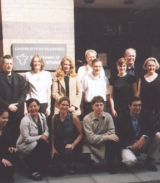 |
Séminaire international: la transparence démocratique de la PESD
Bradford University-Norwegian Institute of International Affairs
30 juin, 2001
30 June - 2 July 2001Venue: Department of Peace Studies, University of Bradford, UK
Organised jointly by the University of Bradford (UK) and the Norwegian Institute of International Affairs (Norway)
This was the first workshop of the EDSP Democracy Project. Organised jointly by the University of Bradford (UK) and the Norwegian Institute of International Affairs (Norway). It aimed to examine the theoretical and methodological underpinnings for the EDSP Project, and to examine issues and challenges relating to the 'accountability gap' in three thematic areas
|
|

